ADVOCATE
University of San Diego School of Law

PLUS:
❱ Artificial intelligence and the law
❱ Inspiring advocacy for the greater good
❱ Words of wisdom for the road ahead


PLUS:
❱ Artificial intelligence and the law
❱ Inspiring advocacy for the greater good
❱ Words of wisdom for the road ahead
As Margaret Dalton ’94 (JD) passes the torch to new Vice Dean Robert Muth, the two leaders reflect on their shared passions for service and education
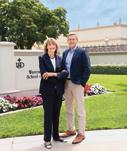
Professor of Law and former Vice Dean
Margaret Dalton ‘94 (JD) and Vice Dean and Professor of Law Robert Muth.
Robert A. Schapiro, JD
Dean and C. Hugh Friedman Professor of Law
Robert Muth, JD
Vice Dean and Professor of Law
Emily Nagisa Keehn, JD
Assistant Dean, Law Student Affairs
Stephanie Kiesel ’11 (JD)
Assistant Dean, Finance and Administration
Judith Lihosit ’97 (JD)
Assistant Dean and Director of the Legal Research Center, Professor of Legal Research
Debbie Rider ’84 (JD)
Assistant Dean, Development and Alumni Relations
Alison Bushan
Senior Director of Marketing and Communications
Michael Chavez, JD
Assistant Dean, Admissions and Financial Aid
Ronald Han, JD
Assistant Dean, Law Careers and Professional Development
Dr. Karen Sigmond ’96 (JD)
Assistant Dean, Graduate, International and Certificate Programs
Chair of the Board
Erin P. Gibson ’03 (JD)
Vice Chair of the Board
Dennis J. Doucette ’86 (JD)
Immediate Past Chair
Alan K. Brubaker ’76 (JD)
Members
Derek Aberle ’96 (JD)
Hon. Olga Álvarez ’02 (JD)
G. Edward Arledge ’73 (JD)**
Hon. Richard Aronson ’72 (BA), ’75 (JD) (ret.)**
Richard M. Bartell ’75 (JD)
Angela A. Bartosik ’93 (JD)
Adam J. Bass ’88 (BA), ’91 (JD)
Hon. Michael S. Berg ’81 (JD)
Erin Bosman ’94 (BBA), ’99 (JD)
Matthew J. Bresnahan ’07 (JD)
Robert S. Brewer Jr. ’75 (JD)
Benjamin C. Bunn ’89 (JD)
Elizabeth “Libby” Carson, JD**
David S. Casey Jr. ’74 (JD)
Stephen P. Doyle ’84 (JD)
Bibianne U. Fell ’04 (JD)
Michael A. Ferrara Jr. ’72 (JD)
Thompson Fetter ’67 (JD)
C. Hugh Friedman, JD**+
Gordon L. Gerson ’76 (JD)
Robert H. Gleason ’98 (JD)
Hon. Allison H. Goddard ’00 (JD)
Susan S. Gonick ’86 (JD)**
Hon. J. Richard Haden ’74 (JD) (ret.)**
John R. Henkel ’77 (JD)**
Karen P. Hewitt ’89 (JD)
Denise Hickey ’94 (JD)
Hon. Richard Huffman, JD**
Peter J. Hughes**+
Steven R. Hunsicker ’75 (JD)
Jennifer “Jenn” Jett, JD
Shaka H. Johnson ’03 (JD)
Michael B. Kaplan ’72 (JD)**
Kimberly M. Koro ’86 (JD)
Hon. Melinda J. Lasater ’73 (JD)**
Stanley W. Legro**+
Patrick W. Martin ’92 (JD)
Haida Massoud Mojdehi ’94 (JD)
Hon. Barbara A. McAuliffe ’89 (JD)
Hon. Judith McConnell, JD**
James R. McCormick Jr. ’97 (JD)
Jack McGrory ’81 (JD)
Gerald McMahon ‘64 (JD)**+
Edwin F. McPherson ’82 (JD)
Scott L. Metzger ’79 (JD)
A. John Murphy Jr. ’72 (BA), ’75 (JD)**
Andrea Myers ’08 (JD)
Virginia “Ginny” C. Nelson ’79 (JD)**
Katherine “Katie” L. Parker ’02 (JD)*
Hon. Louisa S Porter ’77 (JD) (ret.)
Michael J. Rider ’83 (JD)
Kristin Rizzo ’06 (JD)
Paul E. Robinson ’73 (JD)
Frank E. Rogozienski ’71 (JD)
Dean Robert A. Schapiro, JD*
Frederick Schenk ’78 (JD)
Congresswoman Lynn Schenk ’70 (JD)**
Edward P. Schlesier ’89 (BBA), ’00 (JD)
Gary W. Schons ’73 (BA), ’76 (JD)
Ronson J. Shamoun ’98 (BAA), ’02 (JD), ’03 (LLM)
Thomas E. Sharkey ’59 (JD)**
Susanne Stanford ’75 (JD)**
Todd F. Stevens ’88 (JD)
George G. Strong Jr. ’74 (JD)
Dawn S. Theodora ’87 (JD)
Michael T. Thorsnes ‘68 (JD)**+
Hon. Robert J. Trentacosta ’79 (JD)
Vickie E. Turner ’82 (JD)**
Michael J. Weaver ’73 (JD)**
Christopher Wesierski ‘78 (JD)
Charles B. Witham ’98 (JD), ’99 (MBA)
*ex-officio member
**emeritus member
+deceased
President
Katherine L. Parker ’11 (JD)
President-Elect
Robert K. Foster ‘19 (JD)
Immediate Past President
Carolina Bravo-Karimi ’08 (JD)
Matthew L. Abbot ’15 (JD)
Dylan M. Aste ’11 (JD)
Beth K. Baier ’84 (JD)
Alan H. Barbanel ’82 (JD)
Ross E. Bautista ’16 (JD)
Hon. Marissa Bejarano ’01 (BA), ’04 (JD)
David S. Casey, III ’18 (JD)
Megan Donohue ’09 (JD)
E. Scott Dupree ’77 (JD)
Nicholas J. Fox ’11 (JD)
Kirsten F. Gallacher ’12 (JD)
Erin F. Giglia ’01 (JD)
Benjamin Gourley ’20 (JD)
Joy Utomi Hartmann ’11 (JD)
Ashley T. Hirano ’09 (JD)
Curtis M. Jackson ’18 (JD)
Knut S. Johnson ’86 (JD)
Desi Kalcheva ’17 (JD)
Julianna H. Kat ’16 (JD)
Professor Michael B. Kelly, JD
Alex L. Landon ’71 (JD)
Erin P. Lupfer ’17 (JD)
Noel J. Meza III ‘19 (JD)
Carola Murguia ‘20 (JD)
Berenika Palys ’18 (JD)
Sophie Parker, SBA President*
Dean Robert A. Schapiro, JD*
Benjamin Schenk ’20 (JD)
Phillip M. Shelton, Ph.D. ’22 (JD)
Patrick C. Swan ’15 (JD)
Francis J. Tepedino ’74 (JD)
Hon. Victor M. Torres ’84 (BA), ’88 (JD)
Noel B. Vales ’97 (JD)
Hon. Christopher T. Whitten ’91 (JD)
Jessica G. Wilson ’02 (BA), ’06 (JD)
*ex-officio member
ADVOCATE STAFF
Editors
Alison Bushan
Eli Roberts ’22 (BA)
Alexis Vercollone
Contributors
Brigid Bennett ’81 (BA)
Allison Foust
Shari Baurle Green
Jeanette Nichols
Debbie Rider ’84 (JD)
Photographer
Grace Goodale
Design
Diablo Custom Publishing
Advocate is published by the University of San Diego School of Law Department of Marketing and Communications.
Please address all correspondence to:
Advocate
University of San Diego School of Law 5998 Alcalá Park
San Diego, CA 92110-2492
Email: lawpub@sandiego.edu © 2024 USD School of Law
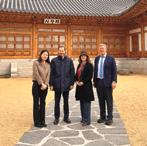
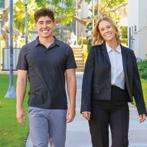
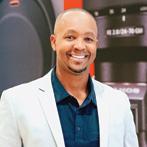
2 DEAN’S MESSAGE
AI AND THE LAW
Artificial intelligence raises complex questions for legal educators, practitioners and students alike. Members of the USD School of Law community weigh in.
16
SERVING THE GREATER GOOD
For nearly 45 years, the Centers for Public Interest Law (CPIL) and its founder, Robert Fellmeth, have been influential advocates for change. Now, as Fellmeth nears retirement, CPIL promises to continue his groundbreaking work well into the future.
20 A SHARED VISION
As Robert Muth succeeds Margaret Dalton ’94 (JD) as vice dean, the two leaders reflect on their mutual passion for service, clinical education and the future of the law school.
24 WISDOM FOR THE ROAD AHEAD
California Chief Justice Patricia Guerrero gave uplifting advice to the Class of 2024 at the School of Law’s 67th Commencement.
Dean Robert A. Schapiro reflects on how the law school continues to build on its rich history to ensure a bright future.
3 DISCOVERY
Updates on USD Law newsmakers and events, including the Class Action Law Forum, new leadership for the Board of Visitors, global initiatives and more.
8 STUDENT SUCCESS
The law school takes an innovative approach to ensure that students thrive. Plus: a major win for the Appellate Clinic, SBA President Sophie Parker and more.
26 FACULTY FOOTNOTES
News about faculty members’ scholarly publications, achievements and activities.
32 GIVING
Were you there? Photos from alumni events and reunions. 6 36 10
The generous donors who support the law school make a world of difference.
36 CLASS ACTION
Catch up with the personal and professional lives of alumni.
43 IN MEMORIAM
USD School of Law mourns the passing of alumni and friends.
46 CONNECTING ALUMNI
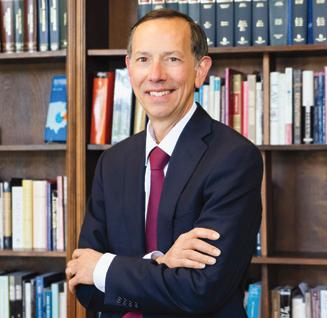
As we commemorate the School of Law’s 70th anniversary, we celebrate and acknowledge the exceptional individuals who have brought us to where we stand today. Our history is our foundation, and it allows us to look toward the future and expand the reach of USD Law. I am eager for you to see how we are building on our rich history to set the standard for the future of legal education in today’s ever-changing world.
We have been hard at work redefining student success, and today’s scholars are more supported than ever by faculty and administrators. In this issue, you will read about how our Student Affairs team used research and data to develop new support programs, including our JD Immersion Program for firstgeneration law students, Academic Success Fellows program, bar exam study stipend plan and more.
In this issue, we also highlight some exciting transitions. We applaud retiring esteemed faculty colleagues
who share parting thoughts after decades of service to our school. We also celebrate the Centers for Public Interest Law and recognize the accomplishments of its founder, Robert Fellmeth, who will retire after nearly 45 years at USD Law. Finally, as former Legal Clinics Director Bob Muth succeeds Margaret Dalton as vice dean, we examine how their mutual passion for service has positioned our school to generate an extraordinary positive impact both on our students and our community.
As we continue to expand our global reach, alumni, students and faculty have been instrumental in hosting events in China, South Korea and Mexico. While securing partnerships with acclaimed international law schools like the Instituto Tecnológico Autónomo de México in Mexico City, we also have launched our online LLM in U.S. Law in English and in Spanish. This year, we sadly lost several foundational members of our law school community. You can read more about them starting on page 43. Their remarkable lives remind us of the vital role our alumni play in making our law school, and our world, a better place. Not only do our alumni support our campus community through contributions to our facilities and scholarship funds, they also promote positive transformation in the world. In this issue, you will read about the efforts of our alumni to rescue Afghan women judges, advance data privacy amid developments in AI, raise funds for local children’s organizations by jamming with their rock band and more. I want to thank our generous alumni and donors for their unmatched dedication to the School of Law and our community.
It is a very exciting time at our law school. Please join me in looking toward a future filled with promise and possibility. I look forward to seeing you on campus soon!
ROBERT
A. SCHAPIRO
Dean
and C. Hugh Friedman
Professor
of Law
CLASS ACTION LAW FORUM BRINGS TOGETHER FEDERAL JUDGES AND TOP PLAINTIFFS’ AND DEFENSE ATTORNEYS
❱❱ Six years ago, USD School of Law and Western Alliance Bank teamed up to establish the Class Action Law Forum (CALF) in an effort to understand, educate and implement trial strategies in complex litigation, including class action, multidistrict litigation and mass torts. Practicing attorneys, judges, qualified claims administrators and financial institutions that expertly manage settlement proceeds play an instrumental role driving curriculum for the conference. Panel discussions focus on recent decisions, expert advice and strategies shared by lawyers and professionals who are at the top of their game. Uniquely, conference content keeps pace with this rapidly evolving area of the law.
Founded by David S. Casey, Jr. ’74 (JD), the conference promulgates Casey’s belief that this event should provide opportunities for students to interact with leading jurists and litigators. Each year, attendees hear insights and take part in discussions on the most important developments and issues surrounding class actions and mass torts. This year’s conference included 16 sitting federal judges and top defense and plaintiffs’ attorneys. This three-day forum not only provides an excellent opportunity to learn more about the complexities of class action and multidistrict litigation, but also provides a forum to share the scholarly insights of USD faculty members, the legal expertise of our alumni and the impressive acumen of our outstanding students. Extending the reach of USD School of Law beyond the four corners of the classrooms is an important part of our educational mission.
The exceptional educational opportunities, which have come to be the cornerstone of the Class Action Law Forum, stand as testimony to the law school’s commitment to enriching the training and experience USD provides to legal practitioners, business executives, students and the larger
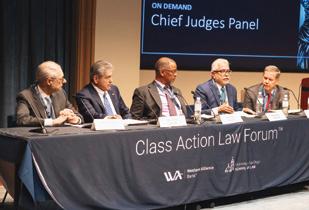
legal community. The conference enables the law school to increase public awareness of the exceptional work being done on behalf of children and those of low and moderate income who rely on the 11 direct service legal clinics at USD. USD’s public interest work makes the law school an ideal option to receive class action cy pres awards. Cy pres awards are residual funds in class action settlements or judgments that, for any number of reasons, are unclaimed or cannot be distributed to the intended recipients. Instead, these funds can be awarded to a nonprofit organization whose work advances the public interest and indirectly benefits the class members.
Seventeen accomplished students from USD School of Law played an integral role in the event. They were involved as research assistants organizing discussions and gathering content for many of the main panel presentations. “CALF is a particularly important event,” said Shawn Miller, professor in residence at USD School of Law and a Class Action Law Forum Steering Committee member. “Not only do our students get to attend and participate, they have the opportunity to learn from some of the most important judges, attorneys and others involved in class actions and mass torts.”
Class Action Law Forum registration and sponsorship proceeds directly benefit the Western Alliance Bank Scholarship Fund, which supports a law student at USD Law who is in financial need and participates in CALF. This year’s recipient was Dina Qubain ‘24 (JD), a student who was the comment editor of the San Diego International Law Journal, an extern for U.S. District Court Judge Andrew Schopler, a legal intern with the USD Entrepreneurship Clinic and a research assistant with the Casa Cornelia Law Center. Passionate about the protection of personal information, she plans on specializing in digital privacy and cybersecurity litigation.
Save the dates for the 2025 Class Action Law Forum: March 18–20, 2025.
Erin Gibson ’03 (JD) and Dennis Doucette ’86 (JD) are helping guide the board—and the law school— to the next level
❱❱ As USD School of Law continues to extend its reach as a world-class center of legal education, it often turns to its Board of Visitors for counsel and support. An advisory group made up of accomplished alumni as well as non-alumni leaders in legal practice and the judiciary, the Board of Visitors plays a unique role in furthering the law school’s mission.
In 2023, the Board of Visitors welcomed new leadership. Erin Gibson ’03 (JD) was named board chair, and Dennis Doucette ’86 (JD) was named vice chair. With impressive professional track records and longstanding commitments to their alma mater, Gibson and Doucette are well positioned to help usher in an exciting new era for the law school.
“It is an extraordinary honor to lead the BOV,” said Gibson, a partner at DLA Piper. “The board members are distinguished, devoted to USD and civic-minded, and they believe in giving back. To be able to stand in front of such a dedicated group and help lead the board into the future is an incredible opportunity.”
Gibson added that the board is actively engaged in supporting the university’s fundraising campaign and its efforts to modernize the law school’s facilities. “The board is committed to supporting Dean Schapiro and his vision,” she said. “We share a passion for ensuring student success and want to support the law school’s efforts to realize that goal.”
Like many members of the Board of Visitors, Gibson expressed gratitude to USD Law for providing her with a quality education and an engaged community. “I can’t imagine where my life would be without USD,” she said. “The support I received at USD was so meaningful, and I want to make sure the next generation of students has the same access I did.”
Gibson has received national recognition for her accomplishments at DLA Piper, where she is global co-chair of the firm’s technology sector and chair of the International Trade Commission (ITC) practice. She is a Legal 500 Hall of Fame-ranked trial lawyer in ITC proceedings and a Chambers-ranked trial lawyer in ITC proceedings and patent litigation. “The caliber of the work our team does is exceptional,” she said, “and so much of my inspiration and drive come from my USD experience.”
As vice chair, Doucette works closely with Gibson and plays an active role in the law school’s campaign. He and Karen Hewitt ‘89 (JD) have been named co-chairs of the law school’s Fundraising Campaign Committee. Doucette is also a member of the executive cabinet for the “Lighting the Way Forward” campaign for the university. To lead by example, Doucette and his wife, Margot, generously kicked off the campaign earlier this year with a $1 million gift to the School of Law.
A partner at Procopio, where he previously led the business and technology team and chaired the corporate securities group, he was
recently elected to the firm’s management committee. He also serves as an adjunct law professor at USD, where he teaches business planning and the Experiential Advocacy Practicum. Like Gibson, Doucette credits USD Law with giving him the foundation he needed to succeed.
“My education at USD Law changed my life, and that is one reason I support the school in every way I can,” said Doucette, who, with Margot, is a longtime donor to the law school. “Serving on this distinguished board with others who are as committed to USD Law as I am is a true privilege.”
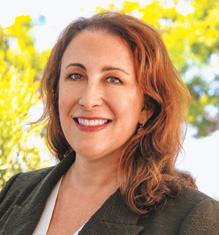
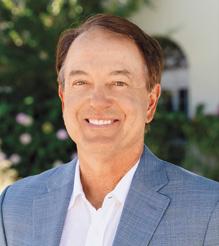


USD marks its 75th anniversary with a visionary anthem
❱❱ In 2024, the University of San Diego commemorates its 75th anniversary in a yearlong celebration. The theme, “Lighting the Way Forward,” will guide this moment in history as the campus celebrates its past, present and future through special events and initiatives.
In times of darkness, we seek the light.
The light of wisdom, that fills our minds.
The light of compassion, that fills our hearts.
The light of faith, that illuminates our paths.
In this place, and from this vantage point,
Our light shines.
We come together as a community,
To foster peace, work for justice and lead with love.
We channel our collective talents,
To fearlessly pursue beauty, goodness and truth.
We cross borders and boundaries,
To create a more hopeful, inclusive and sustainable world.
Inspired by luminary scholars, leaders and supporters,
We are creating futures,
We are expanding the limits of knowledge,
We are breaking new ground,
We are confronting humanity’s challenges,
We are leading innovation to make the world a better place.
At the University of San Diego, we are Lighting the Way Forward.
For 70 years, the School of Law has played an integral role at the university with its belief that scholarly excellence begins with driving change every day. Since its first class assembled in 1954, students have been challenged to take on realworld responsibilities and build their knowledge base while activating deep thinking skills. Through extensive experiential learning opportunities, more than 17,000 graduates have emerged as practice-ready lawyers and leaders.
The 75th anniversary anthem celebrates the great accomplishments of the university and motivates the entire USD community to look toward the future with compassion and an innovative spirit.

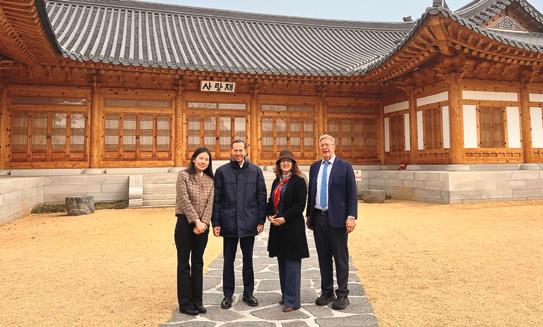
Building on its successful programs for international legal professionals, USD School of Law is launching new partnerships in Latin America and Asia
❱❱ USD School of Law, with its enviable location on the Pacific Rim as well as being a gateway to Latin America, is uniquely positioned to be a leader in international legal education. In the past year, the law school has made significant strides toward that end, strengthening ties with partner institutions in Mexico and South Korea and developing collaborations with universities in China.
In March, Dean Robert A. Schapiro and Assistant Dean of Graduate, International and Certificate Programs Dr. Karen Sigmond ’96 (JD) spent a week in China visiting eight universities in Beijing and Shanghai. “Exploring the various opportunities to collaborate was an amazing, eye-opening experience,” Sigmond said.
Alumni helped make the trip a success. James Zimmerman ’87 (JD), now a partner at Loeb & Loeb in Beijing, initiated conversations with the Chinese law schools, and Dandan Liu, an attorney from Beijing now in an LLM program at USD Law, assisted to coordinate the meetings.
Before arriving in China, Schapiro, Sigmond and Professor Fred Heller, director of the school’s U.S. Law and Policy Program for International Professionals, spent several days in South Korea and visited prominent law firms, the National Assembly, the Ministry
of Justice and the Supreme Court of Korea. During their trip, they held an event for the nearly 200 alumni of the U.S. Law and Policy Program, which invites mid-career legal professionals from other countries to study at USD. Korean scholars, and those from other countries, have participated in the program for many years, and the delegation encouraged other professionals to do so.
“I think there are hundreds of thousands of people around the world who would benefit from the kind of legal education we provide, and I would like to make that education available to them,” Schapiro said. “All of us, including the faculty and students, benefit a great deal from the ability to interact with legal professionals from abroad.”
USD Law is also expanding its connections in Latin America. Last year, it launched a program to teach litigation skills at law schools throughout Mexico. Funded by a nearly $3 million grant from the U.S. State Department, the three-year program trains students and law professors to run mock trials and mediation competitions. Mexico revised its criminal justice system several years ago to allow lawyers to argue cases instead of having judges issue decisions based on written statements, which makes this
We want to be the school of choice for those who seek an international legal career. Since everyone cannot physically come here to get a degree, we are opening other avenues for that to happen.” —DR. KAREN SIGMOND ’96 (JD)
training essential for the next generation of Mexican lawyers.
The program’s success has prompted others to look to USD Law for training. Last year, at the request of the Mexican state of Jalisco, USD held a one-week program on campus for 48 Mexican judges. The teachers included San Diego Superior Court judges Carlos Varela and Enrique Camarena, USD adjunct professor Rachel Carey ’89 (JD) and public defender Jesus Romero ’90 (JD).
The School of Law also partnered with Patrick Martin’s ‘92 (JD) Chamberlain Hrdlicka law firm and the Instituto Tecnológico Autónomo de México (ITAM)—one of the region’s top universities—to host an international tax conference in Mérida, Mexico. The conference drew over 200 attendees. Currently, USD Law is again collaborating with Chamberlain Hrdlicka and ITAM to host an Executive Program on International Taxation in Cross-Border Operations. The 10-month hybrid online/in-person program, which is taught by several leading practitioners including former IRS Commissioner Charles Rettig, provides participants with specialized training in international tax matters from the perspective of the United States and Mexico.
In April, USD Law also co-hosted an event in Tijuana with Hone Maxwell LLP, an international business law and tax firm.
The event, titled “Opening Borders in Legal Education,” was an opportunity to inform attendees about USD Law’s graduate
programs and projects in Mexico. Hone Maxwell managing partner Josh Maxwell ’07 (JD), ’08 (LLM), explained how the school’s LLM programs offer valuable ways to help strengthen the practice of law abroad. “USD is a revered university and has connections to assist people looking to branch out internationally,” Maxwell said.
Hone Maxwell values having an international presence, including their offices in Tijuana and Singapore as well as San Diego. Jared Garfield ’23 (JD, LLM), who opened the firm’s Singapore office, said that many students and professionals around the world aspire to study in the U.S. to enhance their career prospects. “The demand is already there for USD Law to extend its reach,” he said.
To meet that demand, USD Law launched an online Spanishlanguage LLM program in U.S. law in 2023 and has since made the online program available in English as well. After speaking with students and scholars in South Korea and China, Sigmond is tailoring programs for international audiences similar to those already established.
“We want to be the law school of choice for those who seek an international legal career,” Sigmond said. “Since everyone cannot physically come here to get a degree, we are opening other avenues for that to happen.”

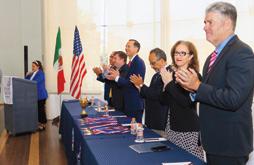
Scan and share this story with your network.
SOPHIE PARKER ’25 (JD) HAS SEEN FIRSTHAND THE POWER OF CLIENT ADVOCACY. NOW SHE’S ON A MISSION TO CHANGE LIVES.
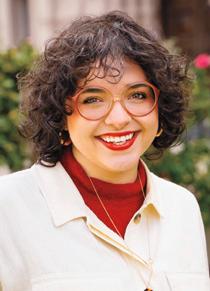
❱❱ Sophie Parker ’25 (JD), the Student Bar Association (SBA) president, knows that while lawyers are in a unique position to advocate for others, rarely do they get to see the big-picture impact of their advocacy. Especially in her intended field of education law, the ultimate reward can come many years after a settlement is reached, or certain privileges are granted. “As an attorney, after you reach a settlement, your client probably is not your client anymore,” she said. “You see them get what they want in the moment, but do not get to see the culmination of the work.”
Parker, however, knows firsthand how continued advocacy can have a lasting impact. Her younger brother has autism, and, growing up, Parker saw him struggle to find his footing in school. Her parents hired various education attorneys to help her brother get the services and support he needed. It did not pay immediate dividends, but by the time he got to high school, the advocacy started to pay off.
“He ended up getting all A’s in high school, and now he is at UC Santa Cruz,” Parker said. “I got to see how advocacy can make a difference in a kid’s life.”
Advocacy motivates Parker’s law school experience and career aspirations. She has volunteered or worked for the San Diego Volunteer Lawyers in their education rights program, the USD Education and Disability Clinic, and the Child Advocacy Institute’s Dependency Clinic, which represents foster youth in San Diego County. Over the summer, she completed an internship with a law firm dedicated to supporting parents’ rights.
The experiences with her clients in these organizations have validated her decision to pursue child advocacy and education law. “I have been able to work with some really awesome kids who have been through a lot and are really resilient,” said Parker. “The most rewarding part of law school has been working with those kids.”
Now, Parker is determined to bring her advocacy to the SBA. She wants the student body to see that the association can accomplish more than just hosting events; it can advocate for students in a way that has an enduring impact. As president, she wants the SBA to better amplify the diverse voices of law students, support student organizations and authentically communicate with administration.
However, Parker knows that, as with most advocacy, the results of her efforts may come further down the road. It does not matter that she does not always get to see the culmination of her work. “I just want to look back at my life and know that I have made the world a better place.”
I have been able to work with some really awesome kids who have been through a lot and are really resilient. The most rewarding part of law school has been working with those kids.”
—SOPHIE PARKER ’25 (JD)
The Experiential Advocacy Practicum earns top honors from Bloomberg Law
Innovation might not be the first word one thinks of when it comes to teaching at a law school. Bloomberg Law recognized that and created the Law School Innovation Program to distinguish law schools that teach students critical lawyering skills to better prepare them for practice.
This year, in the category of Changing Pedagogy, the USD Law Experiential Advocacy Practicum (EAP) was recognized for its innovative programs that advance new methodologies and approaches to student instruction, legal technology implementation and usage, experiential learning, and other facets of legal education.
“Bloomberg Law is pleased to recognize University of San Diego School of Law for its commitment to the future of the legal industry by naming them as a Law School Innovation Program finalist,” said Joe Breda, president of Bloomberg Law “USD Law’s Experiential Advocacy Practicum is a key example of the innovation that is needed for legal education to keep up with the demands of the legal market.”
EAP owes its success to the approximately 50 practitioners who are small group instructors in the program, teaching the courses and mentoring the students. Professor and Lead Instructor of EAP Linda Lane said, “EAP gives 1L students practical exposure to life as a litigator and transactional attorney. Students get to learn and practice the skills that they will be using upon graduation. It is an honor to have this program recognized by Bloomberg Law.”
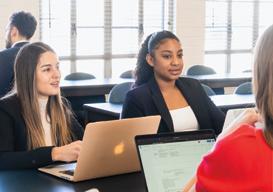
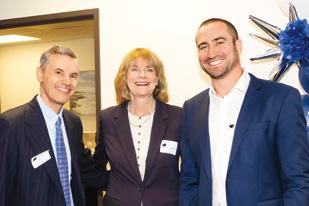
Appellate Clinic students win case in Ninth Circuit Court of Appeals
The cases the USD Law Appellate Clinic receives from the pro bono panel at the Ninth Circuit Court of Appeals are wide-ranging. Some can be a matter of life or death.
It is not a stretch to say that, last spring, students at the Appellate Clinic saved a life. The students—Eitan Peled ’24 (JD), Chase Booth ’24 (JD), Derek Sturhann ’24 (JD) and Dorothy Couchman ’24 (JD)— represented a Salvadoran man, who was facing deportation, in front of the Ninth Circuit Court of Appeals. The man had received several credible threats to his life, and many of his family members had been the victims of homicides in El Salvador. The students argued that deporting their client would violate his right to international protection because of the danger to his life in El Salvador.
The students, supervised by Professors Michael Devitt and David Schlesinger, researched the client’s circumstances, the situation in El Salvador and procedural legal issues. Then, they submitted an opening brief to the court last fall and a reply brief in the spring.
On April 9, Peled and Booth delivered oral arguments in front of the three-judge panel tasked with deciding the case. The Ninth Circuit issued an order in their favor three weeks later.
Noncitizens in immigration cases have no right to appointed counsel. Without the work done by the Appellate Clinic, the client would have been left to navigate proceedings himself.
The Experiential Advocacy Practicum gives students real-world skills.
“Our client has experienced so many terrible things,” said Peled. “To be able to use the tools we have learned in law school to zealously advocate on his behalf is more rewarding than anything else.”
Added Booth, “It is great that the school chooses to devote its clinic resources to representing deserving clients and giving students the opportunity to vigorously defend them.”
“I am blown away by the quality and capability of the students,” said Devitt, executive director of the Appellate Clinic. “There is nothing mock or moot about these cases. The students represented a real individual in what is, in many ways, a life-or-death situation.”
USD Law’s Student Affairs team takes a holistic approach to develop wellness and academic success programs that work for students
❱❱ There is a mental health crisis in law schools and the legal profession, and the research bears it out, said Assistant Dean for Law Student Affairs Emily Nagisa Keehn. “The competitive nature of law school makes it easy for students to start comparing themselves to others, causing a crisis in confidence and a decline in happiness.”
It is why, after joining USD Law in 2021, Keehn placed particular emphasis on developing programming to help students overcome obstacles to well-being and success in law school. While offering student support services is not a novel concept, the breadth and holistic nature of USD’s programs stand out. Keehn and her team are committed to connecting with students from the day they are admitted to the day they pass the bar exam. Their approach is based on the belief that mental health, feelings of belonging, academic performance and bar passage rates are interconnected—and that the best way to evaluate the effectiveness of programs is through data.
It is also an approach that is student-driven and studentcentered. It may seem obvious, but Director for Community Engagement and Inclusion Soha Jafarzade said the key to USD Law’s programming is that it addresses the actual needs of students. “I am not a fan of just implementing programming that I think our students need,” Jafarzade said. “I’ve found it much more successful to genuinely listen to students and implement programs that meet their needs.”
FROM DAY
“When they first come to law school, most students don’t know what to expect,” said Michael Brooks, director of Academic Success and Bar Programs and Professor of Practice. How classes work, how courses are graded, and what one should pay special attention to during lectures or while studying for an exam are all part of the law school “hidden curriculum.” It is what can make the transition to law school so difficult, especially for first-generation law students.
Launched in 2023, the JD Immersion Program is a weeklong orientation specifically designed for first-generation students that is meant to demystify law school. Students learn vital writing and research skills and take a mock final at the end of the week. Students also gain valuable networking opportunities.
Also launched in 2023 was USD Law’s mentorship program. Through a partnership with Mentor Collective, first-year students are matched with returning 2L or 3L mentors who share similar experiences. The program gives incoming students someone to go to with questions about law school and is designed so that even when the program ends, the relationship between the mentor and mentee is strong enough to persist.
Meanwhile, USD’s Academic Success Program assists students who need extra support. The program connects firstsemester students with Academic Success Fellows. Students

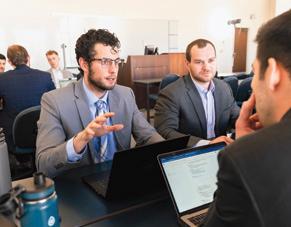
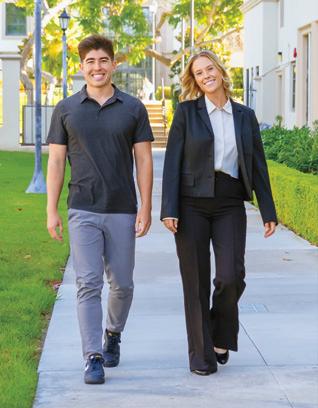

who finish the first semester with a GPA below 3.0 continue working with the fellows. Trained and overseen by the Academic Success and Bar Program’s administrators, fellows are upperdivision students who lead study sessions and hold office hours to help students who are struggling with first-year classes. The goal is to reach students before they fall behind, as well as help them with evidence-based study and testtaking skills.
One’s well-being is known to have a direct impact on success in law school and the legal profession. Even before students set foot on campus, they complete a pre-orientation that connects them to mental health resources. They must register with the state bar to be eligible for the California State Bar’s Lawyer Assistance Program, which provides confidential counseling support for law students. Additionally, students are required to download the TimelyCare app on their phones, which offers 24/7 access to remote mental health care. When they arrive at USD, students have access to individual
wellness advising, wellness sessions that teach strategies for dealing with stress and anxiety, and a prayer and wellness room. Keehn knows these resources are vital. “A lot of students may have had learning differences or anxiety but were able to cope without academic support during undergrad,” she said. “But those coping mechanisms often stop working in law school once students face the fast pace, heavy workload and the pressure of exams.”
To help students learn new ways to cope with the rigors of law school, Keehn introduced a class to the curriculum in 2023 called the Contemplative Practice of Law. Students in the one-unit class learn strategies to cope with stress, meditation techniques and how to practice mindfulness. The class is meant to help students in the present while building their long-term resilience within the inherently stressful legal profession.
When Brooks joined USD Law in 2022, he was tasked with finding innovative ways to increase USD Law’s first-time bar passage rates. One problem was readily apparent: Too many students had to work a job while studying for the bar exam, and that split attention was making it difficult for them to prepare properly.
To remedy the problem, Brooks piloted a Bar Study Stipend program in the summer of 2023. The program gives graduates who would otherwise need a job to support themselves a stipend in exchange for devoting themselves to studying full-time. Brooks and his team added an additional condition for receiving the stipend. “We require any bar taker in the program to meet with us every other week for coaching and support,” said Brooks. The strategy paid off. Nearly every graduate who received the stipend passed the bar exam on their first attempt. During the summer of 2024, the “no-work” stipend program expanded to 19 graduates. The team is also piloting “general” stipends this year with 57 additional graduates, and the data collected as a result will be used to inform future programs in 2025.
“My vision for the future is to continue to make well-researched decisions about what works to support students to reach their goals,” said Keehn. “We have an obligation to our students to continue to evolve.”

Artificial intelligence is new and evolving rapidly, but the technology still raises complex questions for legal educators, practitioners and students alike. Here, members of the USD School of Law community weigh in.
Artificial intelligence (AI) has increasingly become a presence in the field of law— and whether one likes it or not, it is here to stay. Though they bring different perspectives to the topic, USD School of Law faculty, students and alumni all agree on one point: Engaging with this technology is not optional.
Attorneys and students need to interact with AI on a number of fronts, including advising clients on its proper use, litigating cases involving AI and effectively using this technology that is quickly becoming

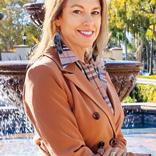
ubiquitous in law offices.
“These tools are going to create efficiency, so people who do not learn how to use them are going to get left behind,” said Judith Lihosit ’97 (JD), assistant dean and director of the USD Pardee Legal Research Center.
To help acquaint students with these new tools, Lihosit and the law library faculty have added lessons on using AI to the curriculum for courses like Legal Writing and Research and offer training on the use of generative AI tools for classes that have written assignments.
Lihosit and her team see AI not as a replacement for learning the fundamentals of lawyering, but as a supplement.
“As educators, we have to teach students to think like a lawyer and develop the critical thinking skills that they will need,” Lihosit said.
On the other hand, fully banning the use of AI for coursework would be a disservice, she said. “We need to teach students to use these tools effectively,” she explained. “Otherwise, they are going to be at a great disadvantage when they graduate.”
Lessons explore the advantages and pitfalls of generative AI like ChatGPT, Perplexity and Microsoft Copilot, platforms that have raised concerns at universities about their application, from enabling cheating to feeding students inaccurate information. Lihosit is also teaching students about the AI tools created by Lexis and Westlaw, which advertise themselves as reliable ways for attorneys and students to conduct legal research. Students learn how to craft prompts to get the information they are looking for out of these technologies. Depending on the prompt, these technologies can deliver a list of cases or even a fully formed legal memo.
Lihosit also chairs the law school’s Generative AI Task Force, which just passed schoolwide rules for the use of AI in written coursework. The legal research center is holding lunch-andlearn training sessions to help faculty understand more about AI and how to utilize it in their courses.
“The right way to ask whether AI is something we want to deploy in a particular context is to ask the comparative question: Is it outperforming people? ”
WARREN DISTINGUISHED PROFESSOR OF LAW ORLY LOBEL
Some law students are already diving deep into AI in their research. Kathryn Bosman Cote ’24 (JD) wrote “Outsmarting Smart Devices: Preparing for AI Liability Risks and Regulations” for the spring issue of the San Diego International Law Journal
The paper explains that both consumers and companies are left vulnerable by the current lack of a framework for litigating harm caused by AI.
As she prepares to take the bar exam, Cote does not believe she is done engaging with this topic that fascinated her as a scholar. “I would love to one day specialize in AI litigation and regulation,” she said.
Orly Lobel, Warren Distinguished Professor of Law and founding director of the Center for Employment and Labor Policy, is having a superstar moment, thanks to her acclaimed book on AI, The Equality Machine: Harnessing Digital Technology for a Brighter, More Inclusive Future. The book was named one of The Economist ’s best books of 2022. Since its publication, Lobel has been juggling global speaking engagements with her USD courses.
Part of what makes Lobel’s work on AI so fascinating is its audacity. For example, she argues that while we are very focused on how AI might violate people’s rights, we are missing the fact that denying the use of available AI
technologies might also violate rights.
“We are too focused on all the things that went wrong, and not focused enough on the cost of not using AI. Sometimes AI is outperforming humans, making more accurate decisions, and making things safer and more fair,” Lobel said.
She highlights a personal example, explaining that one of her daughters, who has type 1 diabetes, wears a blood sugar monitor and insulin pump. These two devices interact to adjust her medication automatically, making AI-enabled decisions to prevent emergencies even as she sleeps. Comparable devices have eliminated countless hours of anxiety and sleepless nights for people with diabetes and their families.
Lobel cites examples of how AI could deliver superior justice even in areas where its use has been controversial, such as sentencing guidelines. The use of AI programs to produce sentencing recommendations has been criticized as exacerbating bias; a Tulane study recently found that AI sentencing appears to discriminate against Black offenders. Lobel does not dispute that AI has made biased decisions, but she does not rule out the possibility that, in some cases, guidelines created by AI might be the fairest available.
“We as humans are full of biases and inaccuracies and irrationalities,”
“ The amount of sophistication and knowledge that they have about you makes the malicious actor much more educated about ways to deceive you. ”
JUSTINE PHILLIPS ’05 (JD)
Lobel said. “The right way to ask whether AI is something we want to deploy in a particular context is to ask the comparative question: Is it outperforming people?”
Beyond the walls of USD School of Law, alumni who practice law are also engaging with AI in diverse ways and on multiple levels.
Justine Phillips ’99 (BA), ’05 (JD), partner with Baker McKenzie; and Andrew Serwin ’92 (BA), ’95 (JD), partner with DLA Piper, both focus on data privacy and cybersecurity, which puts them at the center of a growing storm of AI risks and remedies.
Phillips is using AI in her practice to help her and her clients quickly respond to data breaches. Investigations that once took three to six months can now happen in the same number of weeks. “Using AI-powered review tools, we can now analyze a terabyte of data, find breached personal information like Social Security numbers and quickly identify the people impacted,” Phillips said.
Undoubtedly, those with malevolent intentions have AI, too. Phillips recently wrote an article for California

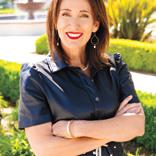

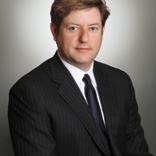
Western Law Review describing how threat actors are weaponizing artificial intelligence. “Deep fakes are one example,” she explained. “Malicious actors are using generative AI to create fake content using audio and video filters to manipulate their voice and videos to exploit individuals and companies. This new technique has allowed bad actors to authorize large wire transfers and deceive IT help desks to change passwords, which enables them to bypass our normal security measures.”
Just as AI tools can help attorneys process data more efficiently, they can do the same for threat actors with stolen data. After harvesting a vast portfolio of knowledge about a target from multiple stolen databases, a hacker is ready to send the perfect phishing email or engage in other social manipulation.
“The amount of sophistication and knowledge that they have about you makes the malicious actor much more educated about ways to deceive you,” Phillips said.
Phillips also assists corporate clients to create and manage security and data governance programs that must cover the new threats and complications from AI.
“ Where AI is more efficient, when is the decision impactful enough that it is worth the cost of having humans make the decision? ”
—ANDREW SERWIN ’95 (JD)
Serwin, who serves as partner and U.S. chair and global co-chair for DLA Piper’s data protection, privacy and security practice, agreed that cyberattacks will grow ever more sophisticated with the availability of AI tools. That will leave companies no choice but to use AI in their defense, if they are not already doing so.
“Without question, the speed of the attacks is already rapid. If these attacks become fully AI-enabled on the offensive side, I think we are going to have to use AI to defend against them, because humans can’t keep up with the pace,” Serwin said.
Of course, Serwin pointed out, automation has been happening for a long time, both in cybersecurity defense and in data processing in and adjacent to the legal field. “It is not like all of a sudden we said, ‘Oh, we are going to let machines make decisions for us,’” Serwin noted. Credit scores, for example, are a type of automated data processing in which consumers allow a computer program to use available data to determine their credit risk.
“The difference with AI is the level of autonomous thought the machine can do and is permitted to do.”
As technology progresses, organizations will have to decide if and when it is appropriate to let machines have more autonomy. “In my view, the
main questions are: Do you use AI to make a decision in a more efficient way? Is it a better or worse decision than the human would make?” Serwin posited. “Where AI is more efficient, when is the decision impactful enough that it is worth the cost of having humans make the decision?”
While the potential—and peril—of AI informs every aspect of the legal profession, USD Law scholars and practitioners are exploring its uses, examining its limits and pondering how it will change our world. As AI tools make attorneys’ work more efficient and may increase access to justice and equality, the responsibility to ensure AI is used ethically and safely always rests with the humans using it. And, with any tool, the legal profession needs to be skeptical, but also open-minded, USD experts said.
“Of course, we should not blindly trust machines,” Lobel said. “But we need to make sure we are asking empirical-based questions. This is where law and regulatory agencies play a very important role.” ■
Scan and share this story with your network.
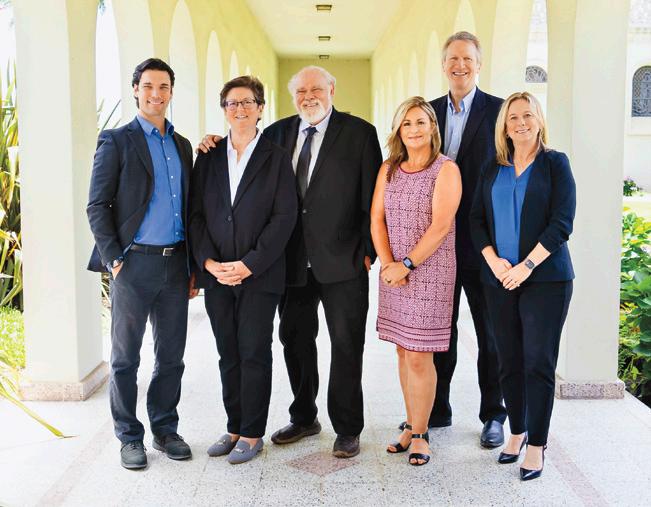
For nearly 45 years, the Centers for Public Interest Law and its esteemed founder, Robert Fellmeth, have been influential advocates for change. Now, as Fellmeth nears retirement, the centers promise to continue his groundbreaking work well into the future.
Before Robert Fellmeth retires, there is something the Price Professor of Public Interest Law still wants to get done: “I want the foster kids to get the money that is due them.”
Preserving federal benefits of foster youth is just one of many crusades of the Centers for Public Interest Law (CPIL), which Fellmeth founded more than four decades ago and still leads at age 79. But it is one especially close to Fellmeth’s heart. For years, he has been working with CPIL’s Children’s Advocacy Institute (CAI) to fight for foster youths’ rights to receive Social Security checks that belong to them but are often retained by state child welfare agencies.
“These are the children of the state,” he said, outrage building in his voice. “How can you embezzle money from your own children?”
Truth be told, while CAI has notched many successes during his tenure, it is unlikely that Fellmeth’s mission will be fully accomplished by the time he retires. Yet he makes it clear that retirement will not stop him from championing the youth. “This is something I want to keep working on as long as I am breathing,” he said.
Fellmeth started CPIL in 1980 with an overarching idea: “Law schools should be doing something in terms of changing the law, improving the law, measuring the law, reporting on the law.”
A former member of Nader’s Raiders—law students recruited by Ralph Nader in 1968 to investigate the Federal Trade Commission— with a Stanford BA and a Harvard
Law degree, Fellmeth focused on his specialty: consumer protection. Over the ensuing decades, through tireless work training students and staff, Fellmeth grew CPIL into a cluster of three centers fighting for the public in distinct areas: the Consumer Protection Policy Center (CPPC), which takes on the core work of the original organization; the Children’s Advocacy Institute; and the Energy Policy Initiatives Center (EPIC). Fellmeth’s wife, Julianne D’Angelo Fellmeth ’76 (BA), ’83 (JD), served as CPIL’s administrative director until her retirement in 2019.
When he ultimately does retire, Fellmeth will leave a rich—and some say irreplaceable—legacy at CPIL. But, in many ways, his tenacious spirit and guiding vision will be felt long after his departure.
“Whoever fills Bob’s shoes is a lucky person, because Bob has set this up for success by putting dedicated people in these positions,” said CAI Administrative Director
Right: Members of the Children’s Advocacy Institute during the 19931994 academic year.
Below: USD Law’s Advocate featured CPIL in a 1986 cover story.
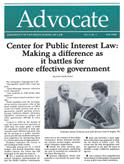
Elisa Weichel ’86 (BA), ’90 (JD). Weichel, like her sister, D’Angelo Fellmeth, started her journey to public advocacy by taking Fellmeth’s courses as a law student. The sisters are far from the only CPIL students to join the staff after graduation: CPPC Administrative Director Marcus Friedman ’21 (JD); Fellmeth-Peterson Associate Professor in Child Rights Jessica Heldman ’04 (JD), and CAI Senior Staff Attorney Melanie Delgado ’01 (BA), ’06 (JD), all cut their teeth in CPIL’s classrooms and clinics.
In addition to the staff advocates, there are the many alumni who proudly use their USD law degrees to fight for the public interest at every level. Fellmeth proudly displays 85 photos of the changemakers he has mentored; Weichel joked that if he had his way, their photos would cover every square inch of the office. They include the Hon. Ana España ’79 (BA), ’82 (JD), presiding judge of the San Diego County Juvenile Court; Robert
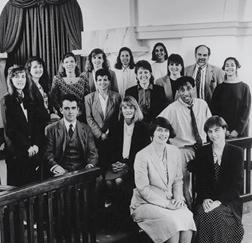
Kelter ’87 (JD), senior attorney at Chicago’s Environmental Law and Policy Center; and many others.
Over the past four decades, the three centers that make up CPIL have each developed their own strategies and focal points while maintaining shared values. Essentially, Fellmeth said, they all harness the law school’s resources to change society for the better, while training students to continue that work in the future.
CPPC carries on the work that Fellmeth pursued from the beginning: monitoring regulatory agencies, such as the California Public Utilities Commission and agencies regulating licensed professions. Students are assigned to attend agency meetings and may pursue a project, such as advocating for new legislation, or writing blog posts or updates for the semiannual California Regulatory Law Reporter
Throughout its history, CPPC has been the driver behind major reforms. The California State Bar is one example. In 1987, Fellmeth was appointed the bar’s discipline monitor. During his tenure, with CPIL support, he achieved legislative changes that apply the Open Meetings Act and Public Records Act to the bar. He also created the nation’s first independent state bar court, so that attorney discipline cases are handled by professional judges, not by peers.
At CPPC, students have opportunities to participate in advocacy. In his 3L year, Friedman was a
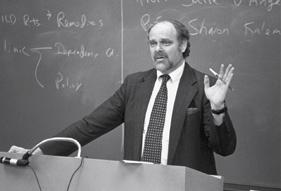
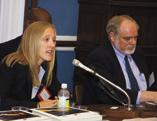
Julie D. Fellmeth Public Interest Law Scholar. This program funds students interested in “developing a ‘big idea’ for using the law as a tool for positive social change.” A survivor of the 2017 mass shooting in Las Vegas, Friedman and CPPC drafted and helped pass AB 1057 (Petrie-Norris) (Chapter 682, Statutes of 2021), which applied the components of “ghost guns” to California’s gun violence restraining orders. It was the first time CPPC had addressed gun violence.
Now that Friedman is CPPC’s administrative director, his experience positions him to encourage students to pursue issues they are passionate about. “It is something that I have learned to use as an example for students, to show how you can introduce something at CPPC that we have not touched on before,” Friedman said.
With the goal of creating a lowercarbon society, EPIC, which was
founded in 2007, operates differently than the rest of CPIL.
“We do not advocate,” explained Scott Anders, EPIC’s administrative director. “Our work is more analytical. Our aim is to provide the best information possible.” A wide range of decision makers, including city councilmembers, state regulators, legislators, business leaders and nonprofits, draw on EPIC’s analysis to create policies.
With a focus on the San Diego region and Southern California, EPIC publishes the San Diego Journal of Climate and Energy Law. The center also hosts the annual Lesley K. McAllister Symposium, which explores different aspects of the climate crisis and the effort to reduce greenhouse gases. Additionally, EPIC sponsors the law school’s Energy Law and Policy Clinic, which gives students opportunities to work with related state agencies on environmental issues.
EPIC has also helped multiple cities develop climate action initiatives. For instance, they worked with city staff to create a Climate Equity Index, first for San Diego and later for the city of Chula Vista.
As Anders explained, “The goal of our work is to answer questions
such as: How are the potential impacts of climate change distributed? How are the potential policy benefits distributed? And who is going to be subject to heat waves?”
It was the Children’s Advocacy Institute that brought Heldman to USD as a law student. Having taught young people in the foster care system, she wanted to help on a more systemic level.
At CAI, Heldman worked with the public defender’s office to represent “dual status” children, who were part of both the child welfare system and the delinquency system.
“CAI focuses on making an impact as broadly as possible for as many children as possible,” Heldman said. “We do that through meaningful legislative advocacy. We do it through impact litigation, such as class action lawsuits. We do it through the drafting and publication of well-researched reports to inform policymakers. As a student, I was engaged in all that work. Every day I guide students to do the same.”
Now, preserving federal benefits of foster youth—the same battle that Fellmeth vowed to fight for the rest of his life—is a major focus for Heldman, CAI staff and students. Many youth in the dependency system qualify for Social Security benefits, either because a parent has died or because they have a disability. In most states, child welfare agencies are able to intercept benefit payments and reimburse themselves for the youths’ care.
As with most of its crusades, CAI is fighting on many fronts: drafting research; aiding the creation of local, state and federal laws; and advocating for executive action at the Social Security Administration and the Administration for Children and Families. CAI recently published a report card grading all 50 states’ performance on preserving children’s benefits.
“Over the last two years, we have seen an incredible amount of progress,” Heldman said. Arizona and Washington, D.C., have passed model laws, and 28 states and jurisdictions have taken positive action on the issue.
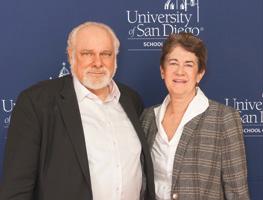
This is just one of many ways CAI fights for children. For decades, CAI has also been waging a similarly large-scale fight to guarantee children have their own legal representation in dependency court. CAI’s efforts have led to progress— all but 13 states now ensure a right to legal representation for children in abuse and neglect cases. CAI has advanced children’s health and safety in many areas, from swimming pools (helping pass California’s Swimming Pool Safety Act) to social media (pushing tech companies to protect children’s safety online).
No one on staff truly believes that retirement day will be the last they see of Fellmeth.
“I would not be surprised if he is still on our weekly conference call after he retires,” Weichel said. After all, now several years post-retirement, D’Angelo Fellmeth is still researching on behalf of CPIL.
Robert Fellmeth and Julianne D’Angelo Fellmeth ’76 (BA), ’83 (JD), who served as CPIL’s administrative director until 2019.
Even with the understanding that they will never abandon the cause, retirement is a good moment to take stock of the couple’s wide-ranging legacy.
“Bob and Julie have been the keystone to public interest in California for decades,” Friedman said. “California is a better place because of their work.” ■
Scan and share this story with your network.
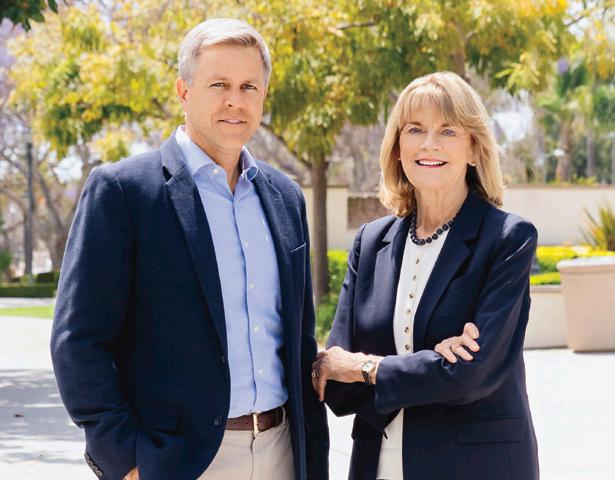
As Robert Muth succeeds Margaret Dalton ’94 (JD) as the law school’s vice dean, the two leaders reflect on their mutual passion for service, clinical education and the future of the law school
Margaret Dalton ’94 (JD) and Robert Muth embody the power of clinical education at USD School of Law.
Dalton served for 12 years as academic director of the law school’s legal clinics, during which time she doubled the number of clinics and established important partnerships across California. Muth, who joined the law school as the founder of the Veterans Legal Clinic, succeeded Dalton at the clinics when she rose to associate dean and ultimately vice dean.
Dalton has now stepped down as vice dean, eager to return to her passion of teaching and research in the fast-changing field of education law.
Muth has succeeded Dalton yet again, assuming the role of vice dean that Dalton has held since July 2019 after being appointed associate dean in 2016.
“She is going to leave gigantic shoes to fill,” Muth said. He noted how Dalton helped guide the school through the early stages of the COVID-19 pandemic as vice dean, before serving as interim dean when Stephen C. Ferruolo stepped down in July 2020.
“It would have been a challenge for anybody, but to be interim dean—and not have the benefit of a vice dean— while you are trying to transition the entire law school to remote operations was an incredible undertaking, and she handled it fantastically,” Muth said.
Dean Robert A. Schapiro echoed Muth’s praise. “Margaret has done extraordinary service for the school as vice dean, as interim dean and as vice dean again. Everyone knows that when you go to Margaret, she will know the right answer,” Schapiro said. “She provided a very smooth and supportive transition for me when I came into this role.”
Schapiro said that people were unanimous in recommending Muth as Dalton’s successor. The only question was whether Muth would leave the clinics, which have been his passion.
“Bob is always interested in serving the institution in the best way possible to move things forward for others,” Schapiro said. “I was delighted when he agreed to take on the role of vice dean. Like Margaret,
he has extraordinary integrity and judgment and an appreciation for students in our doctrinal classes and, of course, in our clinical programs.”
Before law school, Dalton spent 10 years in healthcare administration. “During that time, I saw the crucial work attorneys did in policy and legislation,” she said. “I went to law school to create change, particularly in women’s and children’s health.”
She attended USD Law as one of about 80 part-time students—she had an 11-month-old child and a consulting business at the time. Upon graduation in 1994, Dalton went to work for the California Office of Women’s Health, where she wrote its first report on the intersection between the criminal justice system and domestic violence.
“One of the things we pointed out was that emergency departments should be noticing these things,” she explained. “Something we take for granted now just did not happen then.”
She loved the work, but, after a couple of years, Robert Fellmeth, who had been her regulatory and public interest law professor, called to see if she would come back to USD for a six-month stint. Dalton initially turned him down, but Fellmeth finally persuaded her to join him at the law school’s Children’s Advocacy Institute in 1996. It was a career move Dalton never expected to make, but she was captivated by the impact they were able to make on the lives of children through projects like the Information Clearinghouse on Children and the Children’s Report Card.
“By 1998, I was teaching in the Children’s Policy Clinic,” Dalton said. “I loved teaching. That hooked me on what we do here.”
Students in the clinic wanted to work on special education law, which Dalton was not especially familiar with at the time. It was the students’ personal connections to special education—often through their own families—that convinced Dalton to take on the challenge.
It was a winning combination; Dalton taught students the law while the students taught her about special education. Soon, the students helped defeat a proposed regulation that would have thrown up roadblocks for parents of children with autism. “It was one of those moments when you realize what you can do as an attorney and a professor,” Dalton said.
She planned to leave USD to start her own nonprofit but was drawn back in by an invitation to join USD’s Patient Advocacy Program (now a part of Jewish Family Services) which had just received a new grant to advocate for children whose primary disability was mental health. She later founded USD’s Education and Disability Clinic in 2003. As that evolved, colleagues encouraged Dalton to apply to be the director of all of USD’s Legal Clinics.
Having worked in administration before law school, Dalton was reluctant, but her peers persuaded her that, in the top role, she could best ensure that the Education and Disability Clinic would last. It was an important job—USD’s clinics were launched in 1971 and had become a hallmark of the school, a place where students could obtain hands-on
experience and underserved people in San Diego could receive free topnotch legal representation.
Over the next dozen years, Dalton more than doubled the number of clinics, growing from five to 12 clientserving clinics. The already strong roster included clinics on immigration, criminal and civil law, and expanded to include veterans, entrepreneurship, appellate law, workers’ rights, state sales tax and income tax clinics. She also modernized the clinics, expanding the physical space and adding an electronic case management system.
“I like to say that we are no different from any other law office except we do not have to bill our clients, and that is a great thing,” Dalton said. “And we are exposing students to what they should be doing out in practice.”
In 2016, then-Dean Ferruolo approached Dalton. Mary Jo Wiggins was departing as vice dean, and Dalton was at the top of his list to assume the role. Dalton loved everything about the clinics and did not want to leave, but Ferruolo convinced her that “we could do good things together,” she said. She agreed to give him two years— and served for eight. “It is the story of my life,” she said with a laugh.
Dalton moved from associate dean to vice dean, and then, when Ferruolo stepped down, to interim dean in July 2020, just months into the COVID-19 pandemic.
“Being interim dean during the pandemic was an experience like no other,” Dalton said. It was Dalton who was tasked with navigating the law school’s first full semester under COVID restrictions. For nine months, students,
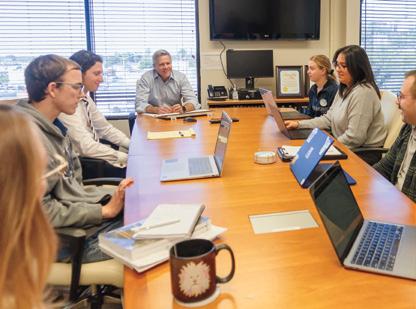
faculty and staff were prohibited from coming to campus.
“I was so proud of our faculty,” Dalton said. “Many of them had never even heard of Zoom.” Yet with support from staff and tech-savvy law students, the school continued to operate with barely any glitches.
Dalton split the 1L class sections in half to make their Zoom meetings more manageable and easier for students to connect. It meant more work for the faculty (doubling up on teaching doctrinal classes), but the faculty rose to the occasion. In addition to remote classes, students and faculty connected in virtual meeting rooms at increased levels and frequencies.
Dalton said the pandemic made the school “stronger than we have ever been.” Now faculty can have guest speakers appear from the East Coast via Zoom, for instance. Professors can also host classes via Zoom if they are unable to meet in person due to illness. “That was a positive out of a very challenging time,” she said.
When Schapiro assumed the role of dean in January 2021, Dalton was able to return to her role as vice dean, while helping with his transition.
Dalton is now making a move that is all her own: She is leaving the deanship to return to a full-time faculty position, in which she will not only teach but also have the time to conduct research on education law.
“I felt like the time was right, and I have done what I wanted to as vice dean,” Dalton said. “That definitely is half of it. The other half is I have missed having time for research and writing. Education law is becoming so complex and growing so fast. I miss being a part of that conversation. I want to make sure all voices are heard, because I think it is a very tough time for educators.”
Muth, who served as a judge advocate in the U.S. Marine Corps, including a 13-month deployment to Iraq, joined

the law school as the founding director of the Veterans Legal Clinic in 2012. Muth was a senior at Northwestern University—and already accepted to Duke University School of Law—when New York City’s World Trade Center was attacked on Sept. 11, 2001. He immediately went to a Marine Corps recruiting office. They told him to finish college.
He completed Marine officer training and law school, ultimately becoming a captain. In 2008, he deployed to Iraq and served as the head of criminal defense for the Marine Corps in that country. He represented Marines on various allegations, from something as relatively benign as a “junior Marine disrespecting a senior Marine,” he
said, all the way up to allegations of war crimes.
Muth received multiple awards for his service and was named Defense Counsel of the Year (2008–2009) for the Navy-Marine Corps Trial Judiciary, Western Judicial Circuit. He was honorably discharged in 2009 and went to work as a civil litigator at a law firm.
He maintained his interest in veterans’ affairs, and when USD School of Law received seed funding to start the Veterans Legal Clinic, he came on board.
The clinic’s initial focus was to represent post-9/11 veterans who had been defrauded out of their GI Bill benefits by for-profit education companies. Muth quickly expanded the clinic’s focus, helping veterans seeking legal assistance on a range of matters, including appealing a denial of Department of Veterans Affairs benefits and challenging less-than-honorable discharges, which can have a significant impact on a veteran’s ability to find work or housing.
“They are righteous cases,” Muth said. “Roughly a third of our clients experience homelessness and, to some degree, they have service-connected disabilities that have impacted their ability to find gainful work. So it is exciting that we are able to have students—many of whom are veterans
“ Education law is becoming so complex and growing so fast. I miss being a part of that conversation. I want to make sure all voices are heard.”
FORMER VICE DEAN MARGARET DALTON ’94 (JD)
themselves—jump in on behalf of other veterans who are struggling. Students can use their newfound legal skills that they have worked so hard to develop here at USD to help someone who really needs their assistance. It is very empowering for them.”
Muth told the story of a veteran who came to the Veterans Legal Clinic after he was denied VA benefits. The clinic accepted his case and, finally, after 10 years, obtained a ruling giving the veteran $488,000 in back benefits and $4,200 a month tax-free for the rest of his life. The man, a Navy veteran suffering from post-traumatic stress disorder, had spiraled into homelessness and was unable to get necessary medical care. Now he has received a life-changing result.
“The odds that his case would have turned out to be a happy story were very low,” Muth said. “But the law students were able to come in with a timely brief that was impactful and successful, and then kept the case alive until they got the right result for their client.”
As Dalton and Muth make their latest transitions at USD School of Law, they continue to share a deep passion for the law school as a whole and for the often life-changing services that the clinics provide. “The clinics do incredible work, and it is really fun to be a part of that,” Muth said. “But I also look forward to the chance to work more broadly at the law school and play a small part in moving forward a variety of initiatives.” ■

On May 18, USD School of Law marked its 67th Commencement, awarding more than 300 JD and LLM degrees to the class of 2024. Patricia Guerrero, Chief Justice of the Supreme Court of California, delivered the inspirational keynote address.
A history-making jurist who has broken glass ceilings throughout her career, Guerrero is in a unique position to offer sage advice to new lawyers. Born and raised in California’s Imperial Valley, she is the daughter of Mexican immigrants and a first-generation college student. She graduated from Stanford Law School in 1997 and went on to become an associate at Latham & Watkins and then an assistant United States attorney in the Southern District of California.
In 2022, she joined the California Supreme Court as an associate justice, becoming the first Latina to serve on the state’s highest court. When she was sworn into her current office in 2023, she continued to make history as the first Latina to serve as California’s chief justice.
At Commencement, Dean Robert A. Schapiro introduced Guerrero as the keynote speaker. “In her leadership role, Chief Justice Guerrero has highlighted her commitment to a more diverse and inclusive judicial branch, to using technology to enhance access to justice and to promote civic education,” he said.
In her remarks to the new graduates, Guerrero celebrated them
as future leaders, protectors of the rule of law, advocates for the most vulnerable and voices for those seeking justice. She also shared the following words of wisdom to help guide them on their journeys ahead.
Guerrero recalled the exhilaration she felt at her own law school commencement. “I was excited about starting my legal career,” she said. “I was thrilled to be joining a top law firm right here in San Diego, doing sophisticated legal work with bright, talented attorneys and to be at a firm that was committed to pro bono work and the training and mentorship that are critical to success of young attorneys.”
At the same time, she remembered feeling anxious. She advised the graduates to not let self-doubt consume them. “The only thing that I have found to counteract self-doubt, and the only way to gain self-confidence, is to work hard and be well-prepared in everything that you do. You already have a solid foundation for overcoming any feelings of self-doubt. And that is because of the knowledge, training and preparation that you have already gained through your time here.”
Guerrero reflected on the gratitude she has for her parents, who moved to the United States so that their children would have better lives. “I would not be here without them,” she explained. “I know that I stand on their shoulders, and I am humbled to serve in this capacity as a reflection of their work and to honor their sacrifices. I know many of you feel the same gratitude in your hearts today toward your families and loved ones.”
She noted that her parents instilled in her the belief that anything is possible with hard work and perseverance, combined with an education and equal opportunities. Guerrero asked the graduates to consider the lessons their loved ones have taught them and be grateful for their support in helping them reach this milestone achievement.
At times, she warned, the practice of law can be lonely and isolating, and she emphasized the importance of nurturing and maintaining relationships with loved ones who can help you find strength when challenges arise. “Rely on those special people in your life who have grounded and inspired you, and you will find the strength to get through the challenges that you will encounter as
“The only thing that I have found to counteract selfdoubt, and the only way to gain self-confidence, is to work hard and be well prepared in everything that you do.”
—CALIFORNIA CHIEF JUSTICE PATRICIA GUERRERO
you embark on this next stage of your journey.”
She commended the graduates for choosing to join the legal profession but cautioned that the road ahead will require them to adapt to rapidly evolving technologies and work environments. As new lawyers, they will need to grapple with the longstanding justice gap, she said, which disproportionately affects marginalized communities. The graduates’ legal degrees will empower them to tackle these challenges.
She closed her address by urging the graduates to remember why they pursued their legal education and to use those memories as they continue in their legal careers.
“Keep alive the goals and values that motivated you to go to law school,” she encouraged. “Keep alive the dreams that have brought you and your families here today. I am excited to see where your paths will lead you and what your futures hold as you contribute in your own ways to the faith and trust in our judicial system that is so important to our democracy.”
Guerrero is hopeful for the future of the Class of 2024. “I am optimistic that these graduates chose to devote their energy and talents to joining the legal profession,” she said. “It is a noble profession that will rely on their fresh perspectives to continue to advance the cause of justice. Our society will look to them as future leaders to help protect the rule of law and serve as advocates for those in need.” ■
The USD School of Law faculty is committed to advancing the study and practice of law. In these pages, learn about our professors’ activities, achievements and scholarship.
Dean Robert A. Schapiro is enriching our understanding of federalism as a dynamic force in contemporary society
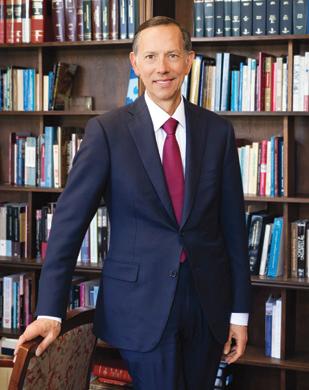
❱❱ A love for legal research and writing brought Robert A. Schapiro into the legal academy decades ago. Now that he is USD School of Law Dean and C. Hugh Friedman Professor of Law, those pursuits “still remain very exciting,” he said.
In addition to his administrative responsibilities, Schapiro, who served as dean of Emory University School of Law before joining USD in 2021, continues to research and publish on his particular area of focus: federalism.
“When one thinks about constitutional law, it is about how we structure society, how we work to achieve certain goals and how we try to ensure democratic values,” Schapiro said.
Federalism began as a distinctive feature of American democracy and continues to evolve, he said. “At various points in our history, the term ‘federalism’ has been used as a way to try to justify protecting states and their sometimes pernicious practices against the influence of the national government,” Schapiro explained. “That was certainly true with issues of slavery and race.”
In more recent decades, however, “states have been doing important work in the area of expanding rights, coming up with new ways of promoting democracy and promoting values in a way that the federal government was not,” Schapiro said.
“I was intrigued by the interaction of the state
I was intrigued by ... seeing federalism as a way to empower all levels of government to try to help people flourish and to protect their rights.” —DEAN ROBERT A. SCHAPIRO
and national governments and seeing how they might work collaboratively,” Schapiro continued, “and seeing federalism as a way to empower all levels of government to try to help people flourish and to protect their rights.”
The move to legalize same-sex marriage began with a decision in the Massachusetts Supreme Judicial Court, for example, and then spread to other states, and ultimately led to the federal government protecting the right to same-sex marriage. Schapiro cites many other examples of states taking the lead on key legal issues, including efforts to reform criminal law, protect or restrict abortion rights, respond to climate change, and set minimum wages and other workplace protections.
“Whatever the issue, it has been interesting to see this interaction between the states and the national government,” Schapiro said. “That really has been part of the genius of federalism. It is not really the separation between the states and the national government, but the dynamic interaction of those different centers of power.”
In 2022, he published a paper in the UC Davis Law Review with two of his former colleagues from Emory University School of Law titled “Are State Constitutional Rights for Sale? Protecting State Constitutional Rights from Unconstitutional Conditions.” He published a paper this year with those same colleagues in The Yale Law Journal titled “The Unconstitutional Conditions Vacuum in Criminal Procedure.”
In addition, Schapiro—a former U.S. Supreme Court clerk for the late Justice John Paul Stevens— founded USD School of Law’s Blue Brie f, an annual review of recent Supreme Court cases (see sidebar). “The Blue Brief is a way for USD’s scholarly faculty to explain recent Supreme Court decisions in ways that would be understandable by a general audience,” Schapiro explained.
In his role as dean, Schapiro is overseeing the law school’s growth, with plans to enhance its facilities and offerings while ensuring it provides a world-class legal education. At the same time, as an internationally recognized legal scholar, he is advancing important ideas about the role of federalism in today’s society.
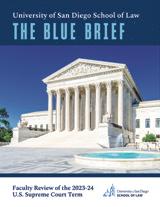
❱❱ USD School of Law is pleased to share the fourth annual Blue Brief, a faculty review of carefully selected rulings from the 2023-2024 Term of the U.S. Supreme Court. Faculty members explore cases on topics ranging from presidential immunity and the validity of regulatory actions to gun rights, taxation and apportionment, and the rights of unhoused people.
In addressing the numerous issues in cases before them, U.S. Supreme Court Justices often rely on research and insights from USD Law faculty, and this past Term was no exception. Professor Michael Rappaport was cited by Justice Clarence Thomas in the majority opinion in Consumer Financial Protection Bureau v. Community Financial Services Association of America . Professor Michael Ramsey’s work was cited by Justice Brett Kavanaugh in his concurrence in United States v. Rahimi State supreme court justices and federal appellate court judges also routinely rely on USD legal scholars when deciding cases at earlier stages of resolution.
We are happy to share the insights of 10 of our eminent faculty members on these important Supreme Court decisions. We eagerly await the opening of the Court’s new Term this fall, and we look forward to reporting back to you in the summer of 2025 with the latest developments.
USD Law extends heartfelt gratitude to the exceptional professors who are retiring from the law school—and embarking on the next chapter of their lives.
We are proud to celebrate the remarkable careers of ten distinguished professors who retired either at the end of this past academic year or will retire at the end of the next: Larry Alexander, Kevin Cole, Robert Fellmeth, Ralph Folsom, Gail Heriot , Jean Ramirez , Steven D. Smith, Thomas Smith, Allen Snyder, and Edmund Ursin. The impacts that these educators have had on our law school are profound. As we bid them farewell, we look forward to the future they have helped build.
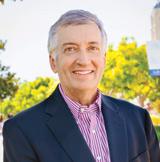

PROFESSOR OF LAW KEVIN COLE: Professor Cole joined the faculty in 1987 and served as the ninth dean of the law school from 2005 to 2011. He teaches and writes in the areas of evidence as well as criminal law and procedure. He will retire at the end of the 2024–2025 academic year.
“Thirty-eight years is a long time to do the same thing,” Cole said. “A benefit of academic life is that the ‘same thing’ changes. Arguments about whether Dudley and Stephens should have killed and eaten a cabin boy have not changed much, the hearsay rule is still a technical swamp, and the enthusiasm of new law students is a constant. Committee work and exam grading remain chores, though the latter less so since almost all students now take exams on computers—gone are the days when a confused student could fudge an answer via sloppy handwriting. But a large component of the job evolves. Academics devote considerable attention to topics of current interest. Doing so is among the great perks of academic life, and a joy that needn’t end with retirement. My 38 years gained variety from my service as dean from 2005 to 2011. The search for truth can be all-consuming for an academic. As a dean, one of the truths demanding attention is how to better prepare students for their futures. USD has made notable steps in that direction. I am sure it will continue to do so. The great students I have met over the years are today’s successful alumni.”
PROFESSOR OF LAW EDMUND URSIN: Professor Ursin joined the faculty in 1975. He teaches classes on products liability, torts, injury compensation and deterrence, jurisprudence and legal theory. He will retire at the end of the 2024–2025 academic year.
“I began my teaching career in 1970 in an era in which the California Supreme Court was rewriting the law of torts in the most dramatic episode of judicial lawmaking in the history of tort law,” Ursin said. “At the time, there was concern among many about this ‘judicial activism.’ I somehow came across what Justice Holmes had written about judicial lawmaking in the common law, as opposed to constitutional adjudication. For Holmes, it was the job of judges to shape the law to reflect the felt necessities of their society. That led me to other great judges: Cardozo, Traynor and Posner and their shared view that, as Judge Posner has written, in common law subjects judges rewrite the law as they go along, reflecting the conditions and values of their time.
This has been true descriptively of the liberal California Supreme Court from 1960 to 1986 and the conservative court in the years after that.
This perspective informed my thinking about law, teaching torts and writing.”
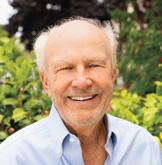
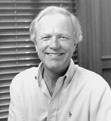
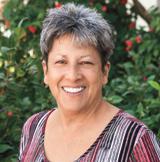
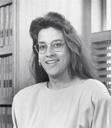
PROFESSOR OF LAW JEAN RAMIREZ: Professor Ramirez joined the faculty in 1995. She teaches in the areas of trial advocacy, criminal law and juvenile law. When not teaching, she has devoted her time to representing families and children. She will retire at the end of the 2024–2025 academic year.
As told by Professor Margaret Dalton: “Jean has always put students and the law school first. In 25 years of working with her, I knew I could count on her to fill a gap when needed in the areas of criminal law. Popular among the students, we had to assign a large classroom to fit everyone who wanted to take her courses! Jean never forgot her roots as a public defender and felt strongly that law students needed practical training in addition to black letter law. She proposed a new course, California Criminal Litigation Skills, which tracks a criminal case from arrest through sentencing, providing students with an overview of the process. Jean approached the course so students interested either in prosecution or defense would develop appropriate skills to enhance their career and commitment to clients. Beloved by her students and colleagues, Jean will be dearly missed by all.”
“It has been a labor of love,” Ramirez said.
PROFESSOR OF LAW THOMAS SMITH: Professor Smith joined the faculty in 1992 after a career practicing law in Washington, D.C. He teaches and writes in the areas of jurisprudence and legal theory, artificial intelligence and economics. He will retire at the end of the 2024–2025 academic year.
“My best memories of USD Law will probably be of the seminars I taught in my last decade or so there,” Smith said. “My first was on constitutional history, where we looked at historical documents from the era of the framing. I may have lost my faith in John Locke’s constitution, but I gained some in my students. In the second seminar, Artificial Intelligence and the Law, we read a collection of articles on various hot topics, such as AI and surveillance. By this time, I had adopted Lynne Dallas’s suggestion that I teach the class as she taught her seminars, calling on each student to comment on each article. The classes were transformed, making each one a real community effort. Teaching I found was like being a coach. You urge your kids on, telling them to run, run, run over the hill. In a moment, they are gone, and you have another batch, another set of hopes to nurture and fears to reassure. I always say, stay in touch, let me know how you are doing, but they seldom would. But some do. They let me know of their successes and thank me for what I did, and I reckon it must have been something.”
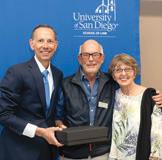
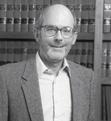
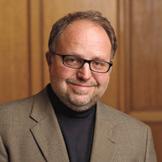
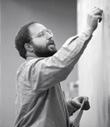
PROFESSOR OF LAW RALPH FOLSOM: Professor Folsom joined the faculty in 1975. He taught courses on international law and was instrumental in the development of USD’s LLM in U.S. Law (formerly LLMC) program for foreign law graduates and USD Law’s Summer Abroad programs. He retired in August 2024 after 49 years of teaching.
“My thanks to USD, its faculty, students and alumni for supporting me and my soulmate of 54 years,” Folsom said. “Following Captain Pixie’s astute guidance, I urge all of you to remember the words of Mark Twain: Twenty years from now, you will be more disappointed by the things you didn’t do than those you did. So throw off the bowlines. Sail away from safe harbor. Catch the wind in your sails. Explore. Dream. Discover Being a law professor has been and remains a privilege. Thank you. Keep in touch.” rfolsom@sandiego.edu
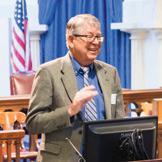
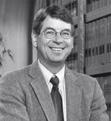
PROFESSOR OF LAW STEVEN D. SMITH: Professor Smith joined the faculty in 2002 after teaching at Notre Dame, the University of Colorado and the University of Idaho College of Law. A prolific author, he has published 10 books for lawyers and general audiences. He will retire at the end of the 2024–2025 academic year.
“Teaching and scholarship,” Smith said. “Scholarship and teaching. For some, scholarship is the painful price one pays for an academic career. Not for me. Wouldn’t it be better, I have sometimes thought, to be relieved of teaching duties so that I could work without distraction on something I am relatively good at?
But no, not really. Interaction with students has been a valuable testing ground for ideas. My first article that gained much attention (a root-and-branch criticism of the First Amendment ‘no endorsement’ test) and was cited more than once by the Supreme Court owed a lot to my students. I initially wrote an article praising the test, but then completely rewrote it after I could not persuasively defend it against student criticisms in a con law class.
More importantly, teaching has been a valuable reminder that it is people who ultimately matter—not articles or even ideas. Immersed in scholarly projects, I have sometimes inwardly complained when students have wandered into the office to talk but have always ended up feeling glad for the conversations. USD students are such interesting people! And can I ever forget the course in which a rubber ducky was perched on the podium when I came in one day, the next day two duckies, then four . . . doubling daily up to 128 duckies (one large one dressed up to look like me) lined up across the whole front of the classroom?
Teaching and scholarship. It has been a blessed combination.”
PROFESSOR OF LAW ALLEN SNYDER: Professor Snyder has dedicated his energies to the law school’s clinical program for over 40 years. During his time at USD, he taught international negotiation and the Civil Clinic. Throughout his career, he has devoted himself to training lawyers not just at USD but around the world. He retired in August 2024.
“As I move on from teaching, I am reminded of the importance of treating everyone as fairly as I can,” Snyder said. “Focus on the student where he or she is today. The rest will take care of itself. I remember, early in my career, giving a student a lower grade than she actually earned— on the basis that she would continue on and I could award a higher grade the next semester. It did not work out as I planned. She was rightfully disappointed and chose not to continue. She was/is a wonderful person whom I still regard with the highest respect—and though I messed it up for her, I learned a great lesson.
I also want to encourage us all to keep close connections with people who are actually practicing law. The skills needed to practice change faster than we wish, and keeping up with practice changes keeps us relevant for our students. Even better, practicing lawyers treat us with more respect than we likely deserve, once they think we aren’t going to engage in Socratic torture.
Finally, I would like to remind us all as professionals with special responsibility for ‘the law’ that the most significant mistake we can make is thinking the job is done. Especially with regard to protecting the least powerful, whenever we think we have crossed a barrier and will never go back, we start going back.”
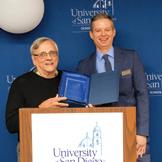
Professor Allen Snyder, now, with Eric Austin ’11 (JD), interim academic director of the USD Legal Clinics, and then.
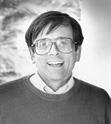
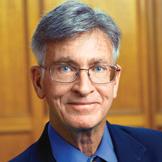
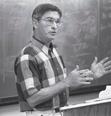
PROFESSOR OF LAW LAWRENCE ALEXANDER: Professor Alexander joined the faculty in 1970. He teaches and writes in the areas of constitutional law, criminal law, and jurisprudence. He will retire at the end of the Fall 2024 semester.
When I began my law teaching career in 1970, it was where I am now—at the University of San Diego School of Law. It was a far different law school at that time. The teaching load was much heavier, and faculty scholarship was virtually nonexistent. I had received my legal education at Yale Law School, a law school at which faculty were expected to produce lots of scholarly articles and books and had much lighter teaching loads. And over the 54 years since I began my law teaching career, the law school’s emphasis became more scholarly, and the per faculty teaching load was reduced to make room for that scholarship. Moreover, although I taught as a visitor at other highly regarded law schools from time to time, because my wife had a legal career to her liking in San Diego, I never seriously thought about leaving USD, and also because it was continuously improving its faculty, its scholarly reputation, and its student body. Today it has a vastly superior student body and faculty from what it had when I came here. And I am proud to have played some role in that change.”
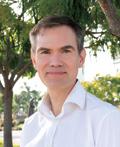
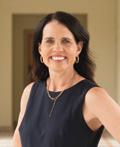
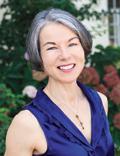
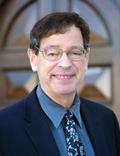
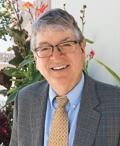
In 2024, five USD Law professors were selected by the university or the law school to receive prestigious honors, professorships and prizes.
❱❱ Professor of Law Laurence Claus was awarded the Class of 1975 Endowed Professorship in recognition of his meritorious teaching, leadership and academic accomplishments.
❱❱ Richard and Kaye Woltman Professor in Finance Miranda Perry Fleischer was named a Herzog Endowed Scholar in recognition of her meritorious teaching and scholarly productivity. Professor Fleischer was also named USD Law’s newest associate dean of faculty, a position that promotes faculty scholarship and acts as the liaison between faculty and law school administration.
❱❱ Professor of Law Miranda McGowan received the Thorsnes Prize for Excellence in Teaching, which is voted on annually by upper-division students and recognizes a professor’s extraordinary effectiveness in assisting students, both inside and outside the classroom.
❱❱ Warren Distinguished Professor of Law Michael Ramsey was named a University Professor, the highest academic honor bestowed university-wide at USD and recognizes outstanding scholarly achievements in teaching and research supporting the mission and goals of the university.
❱❱ Warren Distinguished Professor of Law Steven D. Smith received the Thorsnes Prize for Outstanding Legal Scholarship, which recognizes significant scholarly works.
USD School of Law is deeply grateful to the donors, alumni, faculty and friends who support the law school’s mission. Here are a few of the stories about why they give back.
Michael Kaplan ’72 (JD) learned about philanthropy at an early age, and he and his wife, Terri, continue to pay it forward
❱❱ Michael Kaplan ’72 (JD) was introduced to philanthropy at a young age. Growing up in Duarte, California, he often accompanied his father, Arthur, to the City of Hope Sportsmen’s Club, where people would bring in pledges for the charity. At just seven years old, Kaplan realized he could raise money and collected coins in his elementary school classroom for City of Hope.
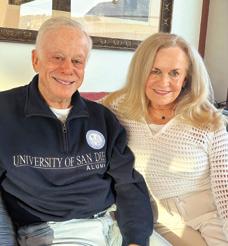
“I grew up in a family that taught there are no bad charities,” said Kaplan.
A first-generation college and law student, Kaplan applied to USD Law at the behest of legendary Professor C. Hugh Friedman, who was a business colleague of Arthur’s. When Kaplan arrived in San Diego for his campus tour, it was Friedman who picked him up from the airport in his red Fiat 124 convertible.
Kaplan recalled, “We pulled up in front of the law school, and Professor Friedman asked if I could drive a stick shift. He threw me the keys and walked inside, and off I went to look at the school. Suddenly, San Diego appealed to me. Because of Hugh Friedman, I applied and got accepted.”
That tour marked the beginning of a multigenerational relationship between the Kaplan family and USD. Kaplan had a law school to call home, and his father, who believed deeply in people and the power of education, had a new cause to support. “My father told me, ’I want to give money to the law school, but I want to do it in a way that impacts people,’” Kaplan said. “He asked me to help him figure out how to fund student scholarships.”
After talking with the dean of the law school, Kaplan was directed to University President Dr. Author E. Hughes. Working with Hughes, the Kaplans set up some of USD’s first university-level scholarships for law students. They would also contribute to a variety of other scholarships and the renovation of the Pardee Legal Research Center.
After graduating from law school in 1972, Kaplan pursued a successful career in real estate law and complex litigation. Today, he is co-owner of the family business, ARKA Properties Group, a national property ownership and management company. Throughout his life, he has always pledged to follow in his father’s philanthropic footsteps. Since becoming an alumnus, Kaplan has served on the USD Board of Trustees (emeritus member), the Parents’ Board and the School of Law’s Board of Visitors (emeritus member). In 2017, he received the USD Author E. Hughes Career Achievement Award. He is also a lifetime honorary member of the City of Hope board of directors, among other affiliations.
Recently, Kaplan and his wife, Terri, generously donated $1 million to support the enhancement of USD Law’s facilities. He believes the importance of giving back must be instilled at an early age. “You just can’t plant a seed today, and tomorrow there will be a 20-foot tree,” he said.
Kaplan believes that the people at USD truly make it successful through their dedication to the students. Like his parents before him, Kaplan knows that the power of philanthropy lies in its impact on individuals. That is why, after five decades of giving to USD, Kaplan keeps paying it forward.
In 2023-2024, generous donors to the law school made a world of difference
The Big Give is a 36-hour online campaign that welcomes gifts in support of USD Law. The 2024 Big Give raised funds to create more opportunities for student success:
❱❱ $615,500+ record-breaking total funds raised
❱❱ $282,000 for specific scholarships
❱❱ $165,000 for general student scholarship support
❱❱ $266,000 for challenge gifts
❱❱ $82,000 for the law school facilities fund
❱❱ $22,000+ raised for First Generation Scholarships
❱❱ 400+ donors
Torero Tuesday is an annual event that unleashes the competitive spirit throughout USD with the generous support of faculty, staff, alumni and friends. The 2023 Torero Tuesday was a resounding success:
❱❱ $131,000 for the law school
❱❱ $54,000+ for student scholarships
❱❱ $25,000+ for most critical needs
❱❱ 120+ donors
Whether a law student at USD is passionate about a special area of law or looking to network, there are many student organization options. Many groups raise funds to support future law students with similar passions:
❱❱ $11,000 for scholarships, travel, speakers and programming
❱❱ 52 active student organizations
❱❱ 86% USD Law students participate in student organizations
The Law Firm Challenge is designed to strengthen the connection between alumni, law firms, legal departments and USD Law. Participants strive for 100% alumni giving in their respective organizations, providing critical support to the law school. Highlights of the 2023–2024 Challenge include:
❱❱ 68 law firms participated
❱❱ $651,648 raised
❱❱ 10 firms attained 100% participation
❱❱ 16 firms with an annual named scholarship
❱❱ University of San Diego School of Law is dedicated to teaching the rule of law and providing access to justice for those needing legal representation. USD is San Diego’s law school and values its role as the source of academic scholarship and judicial leadership. All community members are invited to support USD’s efforts and the campaign to improve law school facilities.
Enhancing the iconic facilities will create spaces that stimulate creativity in doctrinal and specialty instruction and attract experts and students from around the globe. It will strengthen the law school’s reputation and reflect the faculty’s outstanding achievements, students’ excellence, and USD Law’s impact on the legal, business and development communities for the past 70 years.
The campaign to improve facilities is not just about bricks and mortar. It is about opening the door to community engagement, increasing alumni involvement and expanding opportunities for future legal professionals to learn the law. USD Law’s goals center on refining the student experience and igniting career opportunities for graduates while inviting legal experts and community leaders to help redefine what it means to be the hub of legal education in San Diego.
Virginia C. Nelson ’79 (JD), vice chair of the USD Board of Trustees and emeritus member of the law school’s Board of Visitors, and her husband, Mark Andrews, are steadfast in their commitment to USD and the School of Law.

“The law school’s need for improved facilities is at a tipping point,” Nelson said. “What we do now will matter for decades into the future. We want to match the caliber of the faculty, students and administrators with facilities that provide the best learning environment for our students and their success, embrace our alums, and support the community. Mark and I feel very fortunate and grateful to have supported and continue to support what we know will be the further forward and upward path of success for this place we all love.”
To learn how you can support the School of Law, please contact Debbie Rider in the Office of Law Development at 619-260-4692.
STEVE HUNSICKER ’75 (JD) AND HIS WIFE, ANNE SHELBURNE, SUPPORT THE LAW SCHOOL’S MISSION TO MAKE LEGAL EDUCATION ACCESSIBLE TO DESERVING STUDENTS
❱❱ When Steve Hunsicker ’75 (JD) reflected on his career as an associate and partner with Baker Botts in the firm’s Washington, D.C. office, he said, “I always talk about being lucky in my life and legal career, and going to USD Law was a great break for me. I am thankful I went there and met inspiring faculty, smart students and accomplished San Diego lawyers who had a big impact on me.”
While a 3L, Hunsicker was encouraged to pursue a fellowship at the University of Pennsylvania, where he earned his LLM. “I received many job offers while at Penn, including the opportunity to join Baker Botts, which turned out to be a good move.”
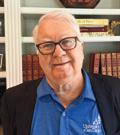
Specializing in the booming field of energy law brought on by the National Energy Act, Hunsicker successfully represented high-profile oil companies. He retired to work on Senator John McCain’s presidential campaign and then re-retired to spend more time with his wife, Anne, at their “hobby farm” on the banks of the Shenandoah River.
Hunsicker remains actively involved with USD Law, serving on its Board of Visitors. He and Anne also generously fund student scholarships, including those named in honor of classmates Raymond Mercado ’75 (JD) (Latinx Scholars) and Bill Baumgaertner ’75 (JD) (Leadership Scholars), to help students succeed.
“I am impressed by the law school’s intent to involve and enroll students from minority groups that have not been well served by the legal community in the past,” Hunsicker said. “It is a reason to be very proud of USD and has moved us to contribute to scholarship funds as well as to support the law school in other endeavors. It means a lot to us to help students who might otherwise be struggling to get a legal education.”
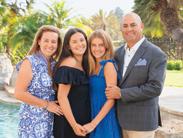
Retired from a telecom career, Jarred Saba ’00 (JD), ’01 (MBA), reflects on the value of his transformative education
❱❱ Jarred Saba ’00 (JD), ’01 (MBA), looks back on his decision to earn both a JD and an MBA from USD as one of the best moves of his life. “The law degree combined with the business degree gave me a massive advantage in the business world,” he said. “As a student, I did not realize how beneficial it would be to have a law degree in my back pocket.”
After graduating from law school, Saba passed the California bar but chose a successful path other than the practice of law. Instead, he embarked on a business career that led him to become the founder and CEO of a multibillion-dollar company by age 40. In 2008, he launched Telecom Lease Advisors, a firm that purchased cellular towers and communications infrastructure, ultimately becoming the largest privately held telecom company in the United States, Canada and Australia. “As the company flourished and grew, my dual degrees in law and business gave me the upper hand over all my competitors,” he recalled. “I credit the success to the support of my wife and family, along with a strong working relationship with my business partner. When we sold the business, seeing our employees share in the success was gratifying. I was determined to share the good fortune with everyone who contributed to the company’s success.”
Now retired, Saba and his family have moved from the Los Angeles area back to San Diego, making it possible for him to renew his active engagement with his alma mater. In fact, his ties to USD have deep roots: He met his wife, Alison ’95 (BA), ’01 (JD), in a torts class as a first-year law student. His brother, Ryan Saba ’97 (JD), is also an accomplished graduate of USD Law.
“Now that I am no longer actively working, I try to give back as much as possible,” Saba said. “I really believe there is no greater long-term investment than education, and that’s why Alison and I are committed to helping USD thrive well in the future.”
LOUISA S PORTER ’77
(RET.)
PROFESSOR
❱❱ When the U.S. military exited Afghanistan in 2021, retired Federal Magistrate Judge Louisa Porter ’77 (JD) and her husband, USD Law Professor of Practice David Brennan ’03 (LLM), felt a familiar sense of dread. To them, it seemed like history was repeating itself almost 50 years after the U.S. withdrawal from Vietnam, where Brennan served in the military and Porter worked on a fact-finding mission.
When the Taliban retook control of Afghanistan, anyone who had worked with the U.S. government became immediate enemies of the new government. One group faced particularly dire straits: women judges.
Representing everything the Taliban detests, these educated, powerful women—nearly 300 in total—had prosecuted many of the same Taliban members that were suddenly out of prison and in charge.
“The United States completely left them behind,” said Porter. “We just looked at each other and I said, David, we have to save the women judges.”
The couple learned that the International Association of Women Judges (IAWJ) was working to get judges out of the country and partnered with the organization to help some 215 judges escape on humanitarian flights. However, when the Taliban ended humanitarian flights in May 2022, a handful of judges were still stuck. It is these judges to whom Porter and Brennan have dedicated much of the last few years.
“Initially, our purpose was to rescue,” said Porter. “But over the past three years, it has become rescue, relocate, resettle.”
Indeed, simply getting the remaining women judges out of Afghanistan is not sufficient. Nineteen of the stranded judges, known to the IAWJ as the Islamabad 19, escaped on foot to Pakistan, but are not permitted to work or go to school. Their visas must be renewed every six months, and if their renewal request is denied, they may be deported to Afghanistan—a virtual death sentence.
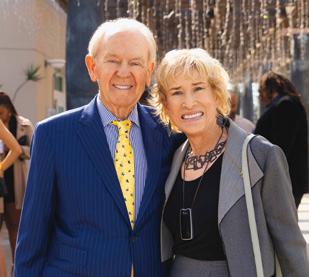
Brennan and Porter started a 501(c)(3) nonprofit called the San Diego Afghan Rescue and Resettlement Fund through which they have raised around $10,000 to help pay the living expenses and visa renewal fees for these judges. They also penned a letter to Congress, signed by 36 retired U.S. judges, urging Congress to pressure the State Department into action.
In addition to their fundraising and lobbying efforts, Porter and Brennan are preparing the necessary framework to welcome one of the Islamabad 19 judges and her husband to San Diego. Working with a team of 10 recruited volunteers (mostly lawyers and retired judges), Porter and Brennan have secured housing and employment for the judge and her husband. Brennan has also worked with Dean Robert A. Schapiro and Assistant Dean of Development and Alumni Relations Debbie Rider ’84 (JD) to establish two scholarships to the LLM in U.S. Law program specifically for women judges immigrating to the U.S. from Afghanistan.
“The scholarship enhances their eventual ability to become fully functioning members of the U.S. legal community,” remarked Brennan.
The work is far from done. Porter and Brennan are hard at work raising money to cover what it will cost for the judge and her husband to restart their lives in San Diego. They are also working to solicit donations to help fund the LLM scholarships. The drawn-out nature of the project has made it difficult, but they are confident that when the judge gets here, her story will help garner support for their efforts. In the meantime, it is about keeping the energy up, and not letting anyone lose hope, especially the judges themselves.
“It takes constant attention, working with the judge so she does not lose hope,” said Porter. “We are assuring her that yes, we are here for you. We are working hard on your behalf, and we will be here for you when you arrive.”
Scan and share this story with your network.
Class Action compiles news about alumni from independent submissions and media resources. Submit your news by emailing your update and photo (.jpg or .tif format, 300 dpi) to lawpub@sandiego.edu.
1971
Alex Landon received the California Attorneys for Criminal Justice Lifetime Achievement Award.
1972
John Tannenberg named a Best Divorce Attorney in San Diego by Forbes Advisor
1974
David S. Casey, Jr. recognized among the 2024 Top 10 San Diego Super Lawyers
1975
Hon. Steven R. Denton received the 2024 Pillar of the Legal Community Award at the annual Red Boudreau Trial Lawyers’ Dinner.
1976
Albert V. De Leon honored by City College of New York with Townsend Harris Medal.
1978
Frederick Schenk named Del Mar Fairgrounds board president.
1979
Hon. Larry Burns retired from the U.S. District Court for the Southern District of California and joined Judicate West.
Hon. Kenneth Medel named Consumer Attorneys of San Diego’s 2024 Judge of the Year.
Virginia C. Nelson named among the 2024 Top Nonprofit Board Leaders of Influence by the San Diego Business Journal
Deborah Reid co-authored Copyright Artfully Explained The book is designed to teach artists about copyright and how it impacts their work.
1980
Thomas Lincoln appointed to the San Diego Ethics Commission by San Diego Mayor Todd Gloria.
1981
Hon. Maureen Hallahan named presiding judge of the San Diego Superior Court.
Ellen Whittemore inducted into the American Gaming Association’s 2023 Gaming Hall of Fame.
1983
Jan Joseph Bejar recognized as a Best Immigration Lawyer of San Diego by Forbes Advisor
1985
Lesa Christenson ’82 (BA) named a Best Divorce Attorney in San Diego by Forbes Advisor.
1986
Dennis Doucette elected to Procopio’s management committee.
Knut Johnson joined Singleton Schreiber as senior counsel.
Kim Koro named a 2024 Top 100 Women in Technology by Technology Magazine.
1987
Peter M. Hughes is the immediate past president of the San Diego Chapter of the American Board of Trial Advocates.
Craig Orent named a Best Criminal Defense Lawyer in Phoenix, Arizona by Forbes Advisor.
1988
Terry Wiley named inaugural inspector general at San Francisco City Hall.
1989
Benjamin C. Bunn elected vice president and membership chair of the San Diego Chapter of the American Board of Trial Advocates. He received the 2024 Daniel T. Broderick III Award at the annual Red Boudreau Trial Lawyers’ Dinner.
Brian L. Frary joined Gordon Rees Scully Mansukhani, LLP as a partner in the San Diego office.
Hon. Patricia Garcia retired from the San Diego Superior Court and joined Signature Resolution.
Hon. David Hood appointed to serve as Stanislaus County Superior Court judge.
Robert (Bob) Juskie received the 2023 Daniel T. Broderick III Award at the annual Red Boudreau Trial Lawyers’ Dinner.
Hon. Sharon Kalemkiarian received the Family Law Lecture Series Award by the Family Law Curriculum Committee. The award is given every two years at the Family Law Institute.
1990
Kathrin S. Mautino recognized as a Best Immigration Lawyer of San Diego by Forbes Advisor.
1992
Cynthia B. Chapman named chair of the board of trustees at the Stevenson School.
Sue Gerry appointed deputy mayor of the city of Yonkers, New York.
1993
Thomas O’Brien joined Greenberg Traurig, LLP’s white-collar defense and investigations and litigation practices in the Los Angeles office.
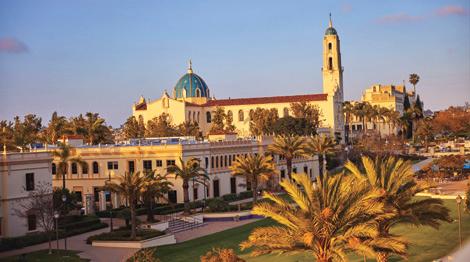
John Alessio ’91 (BS)+ elected managing partner at Procopio for a third term in January 2024.
Daniel Bean elected chair of JaxPort.
Jonathan D. Montag recognized as a Best Immigration Lawyer of San Diego by Forbes Advisor.
1996
Hon. Evan A. Kitahara appointed to serve as Los Angeles County Superior Court judge.
Timothy Scott appointed president and CEO of Biocom California.
Cory Weck awarded the Jennifer Brooks Lawyer of the Year by Western San Bernardino County Bar Association.
1997
Matthew Reback appointed president and CEO of Galaxy Gaming.
Noel Vales named president of the National Filipino American Lawyers Association Foundation for a third term.
1998
Wayne Chancellor joined Womble Bond Dickinson’s Denver office.
Robert Gleason received Princeton’s Alumni Council Award for Service and recognized as a 2024 LGBTQ+ Leader of Influence by the San Diego Business Journal
Marco Mercaldo named among 2023 Best Personal Injury Lawyers in Tucson, Arizona.
Nimish Patel ’98 (MBA) named a member of the Advisory Committee for Trade Policy and Negotiations by President Joe Biden.
1999
John Healy appointed general counsel and corporate secretary of Contineum Therapeutics, Inc.
James D. Miller named managing shareholder of Ogletree Deakins’ Fresno office.
Paul A. Rodriguez appointed San Diego County public defender.
2000
Joseph P. Cullan named among 2023 Best Personal Injury Lawyers in Omaha, Nebraska.
Jason Ohta elected partner at Latham & Watkins LLP as a member of the white-collar defense and investigations practice and litigation and trial department.
2002
Hon. Rohanee Zapanta ’98 (BA) named one of the Most Influential Filipina Women in the World by the Foundation for Filipina Women’s Network.
2003
Ronson J. Shamoun ’98 (BA), ’03 (LLM), recognized among San Diego’s top attorneys for 2024 by SD Metro.
2004
Bibianne “Bibi” U. Fell elected treasurer and national foundation trustee of the San Diego Chapter of the American Board of Trial Advocates and recognized among the 2024 Top 25 Women San Diego and Top 50 San Diego Super Lawyers.
Joanne Franciscus named CEO of Legal Aid Society of San Diego.
Laurie Rowen elected to Orange County Women Lawyers Association’s board of directors.
Damien Schiff presented with the 2023 Veritas Award by American Agri-Women.
Erin Bosman ’94 (BBA) named 2024 Product Liability Lawyer of the Year, the third time she has been recognized as the winner in this category, by Euromoney Legal Media Group’s Americas Women in Business Law Awards.
Joseph C. Alter promoted to vice president, deputy general counsel and secretary within American Financial Group, Inc.
Teodora D. Purcell recognized as a Best Immigration Lawyer of San Diego by Forbes Advisor.
2005
Joshua Beser joined Orrick, Herrington & Sutcliffe LLP’s technology group in the New York office as partner.
Lisa Rosaya joined Manatt’s digital and technology transactions team. + deceased
On Thursday, November 21, USD School of Law will hold its annual Distinguished Alumni Awards ceremony. The Alumni Association Board of Directors presents these awards to alumni who have distinguished themselves at an exemplary level and who embody the high ethical standards and commitment to community service that USD Law seeks to instill in its graduates.
This year’s Distinguished Alumni Awards will be given to Hon. Maureen F. Hallahan ’81 (JD), Shaka Johnson ’03 (JD) and Frederick “Fred” Schenk ’78 (JD).
Judge Maureen F. Hallahan is the presiding judge of the San Diego Superior Court. In 2007, she was appointed to the bench by former Gov. Arnold Schwarzenegger. Since 2012, she has held numerous positions, including presiding judge, assistant presiding judge, supervising family law judge and criminal law judge. She is the former chair of the court’s family law policy committee (2008–2012) and domestic violence committee (2008–2016). Hallahan is a voting member of the Judicial Council of California and vice chair of the Judicial Council’s executive and planning committee. She is a member of the Lawyers Club’s advisory board and the California Judges Association. She has served in the appellate division of the Superior Court and is a former president of the Enright Inn of Court, the
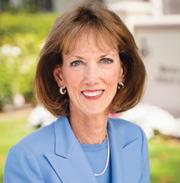
Association of Business Trial Lawyers and the Lawyers Club of San Diego. She also served as co-chair of the San Diego County Bar Association’s judicial evaluation committee. Hallahan is the recipient of many awards and honors, notably the Family Law Judge of the Year for the State Bar of California (2015) and the San Diego Family Law Bar Association Lifetime Service Award (2016).
Shaka Johnson is senior vice president, general counsel at Sony Electronics, where he and his team are responsible for legal affairs and corporate security for the business in North America. He is a member of the diversity and sustainability office leadership team and a previous chair of the pro bono committee at Sony. Johnson is also a member of the USD School of Law Board of Visitors, the San Diego History Center board of trustees and his children’s parent-teacher collaborative board. He previously served on the USD Law Alumni Board’s Diversity and Inclusion Committee and the Association of Corporate Counsel (ACC)—San Diego Chapter board. He actively participated with the group that spearheaded the San Diego County Board and ACC Diversity Fellowship Program and served for 10 years on the Jackie Robinson Family YMCA board. In 2019, he was the Commencement speaker at USD Law’s 62nd graduation ceremony. His accolades include an ACC Top 10 30-Somethings award (2014), a San Diego Business Journal Leaders in Law award (2020), the Dealerscope Inaugural Black Leaders in Consumer Tech award (2021) and two-time recognition by the National Diversity Council as one of the 100 Most Influential
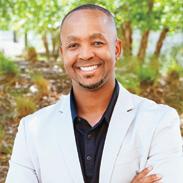
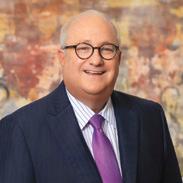
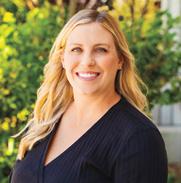
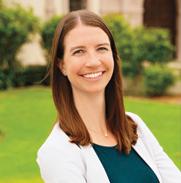
African American Leaders in Business (2021 and 2022).
Frederick Schenk is a partner, head of mass torts and plaintiff trial lawyer at Casey Gerry Schenk Francavilla Blatt & Penfield LLP, where he has practiced for over 41 years. His areas of specialization include asbestos and mesothelioma, automobile accidents, bicycle accidents, burn injuries, construction negligence, head/brain injury and social media addiction litigation. Co-author of the LexisNexis California Automotive Litigation Handbook, Schenk achieved the largest San Diego verdict to date—against asbestos manufacturer Owens Corning Fiberglass—rendering the largest ever punitive damages and economic loss verdict in San Diego. In 2023, he was appointed by Judge Carolyn Kuhl of the Los Angeles Superior Court to the plaintiffs’ steering committee in the Judicial Council Coordination Proceedings lawsuit against large social media companies, including Facebook, Instagram, YouTube, Snapchat, TikTok and others. He is a member of USD Law’s Board of Visitors, past president of the San Diego chapter of the American Board of Trial Advocates, serves on the board of governors of the American Association for Justice, and is president of the 22nd District Agricultural Association, which runs the annual San Diego County Fair. Schenk has been recognized for his pro bono work for Trial Lawyers Care. His awards include Lawdragon’s “500 Leading Plaintiff Consumer Lawyers” and Hall of Fame inductee, Best Lawyers in America list (2006–2020), of which he was awarded Lawyer of the Year, Mass Tort Litigation/ Class Actions (2014, 2018), San Diego Super Lawyers list (2008–2024) and the San Diego County Bar Association Community Service award (2016).
This year’s event will also recognize two Rising Star Recent Alumni, Alexandra Preece Barlow ’14 (JD) and Erin P. Lupfer ’17 (JD).
Alexandra Preece Barlow is a partner in the litigation department of Morrison Foerster LLP’s San Diego office. She litigates product liability matters in state and federal courts involving medical devices, pharmaceuticals, consumer products, automobiles and artificial intelligence. She specializes in high-stakes litigation, often handling matters involving both class actions and coordinated proceedings. During her time at USD, the San Diego Law Review published Barlow’s comment on the recovery of damages by plaintiffs in a persistent vegetative state. She was also a comments editor for the same journal. Barlow participates in student mentoring programs at USD and other local colleges. She is also a member of local legal organizations, including the Association of Business Trial Lawyers and Wallace Inn of Court.
Erin P. Lupfer is a senior appellate court attorney for Hon. Jose S. Castillo at the California Court of Appeal, Fourth District, Division One. She previously worked as an associate at Morrison Foerster LLP, where she litigated consumer class actions and product liability matters. Before that, Lupfer clerked for Hon. Jeffrey T. Miller at the U.S. District Court for the Southern District of California. During law school, she externed for two other federal district judges and worked on an immigration matter before the Ninth Circuit Court of Appeals as part of the USD Law Appellate Clinic. Lupfer has published articles in various legal outlets, including JD Supra, Corporate Secretary and the ABTL Report. She volunteers with the Judges in the Classroom program and is a four-time recipient of the Wiley W. Manuel Certificate for Pro Bono Legal Services. Lupfer serves on the USD Law Alumni Board and participates in the Women’s Law Caucus mentoring program, moot court judging and career panels.
Thank you to Morrison Foerster LLP for their Diamond Sponsorship. To attend or sponsor this inspiring event, please visit law.sandiego.edu/daa
Scan and share this story with your network.
Sebastian Lucier recognized as a Leader of Influence in Technology by the San Diego Business Journal.
Scott Pirrello featured in an AARP article regarding his fight against elder fraud.
Hon. Blair Soper appointed to serve as a judge in the San Diego County Superior Court.
2006
Jennifer Bratt joined Sheppard Mullin LLP’s Del Mar office as a partner in the tax practice group and estate planning and wealth transfer team.
Tiffany Brown joined the National Council of Juvenile and Family Court Judges board of directors.
Min Kang named partner at Hinshaw & Culbertson in the firm’s insurance service industry group in Los Angeles.
Michael Klippert named partner at Wilson Sonsini Goodrich & Rosati LLP.
Emily T. Patajo joined Akerman in Los Angeles as a labor and employment partner.
2007
Hannah Cole elected to San Diego Association of Corporate Counsel 2024 board of directors.
Paul Feldman appointed to serve as Ventura County Superior Court judge.
Adriana Ochoa named a 2023 Top 50 Latino Leader of Influence by the San Diego Business Journal.
Brian Weisel appointed to the Office of Administrative Hearings as an administrative law judge.
Alexa Zanolli elected to the San Diego Association of Corporate Counsel 2024 board of directors.
2008
Courtney Adair named general counsel of Books-A-Million.
Christopher Ayers named 2023 New Leader of the Bar by the New Jersey Law Journal.
Carolina Bravo-Karimi honored by Federal Bar Association and named a 2023 Top 50 Latino Leader of Influence by the San Diego Business Journal.
Nick Goseland named one of Lawdragon’s 2024 Global 100 Leaders in Legal Strategy and Consulting.
Michael Paa joined Quarles & Brady LLP’s San Diego office as of counsel in the labor and employment practice group.
2009
Samin Adib appointed Maricopa County Court commissioner.
Roxanne Nurse (LLM) joined Higgs Fletcher & Mack’s
employment law and trusts and estates litigation practice groups.
Marguerite Hutchinson appointed chief business officer of STORM Therapeutics Ltd.
Jaime Choi joined Sheppard Mullin LLP as an intellectual property partner.
Jordon Ferguson selected as a Leadership Council on Legal Diversity fellow.
Bridget Harrison appointed managing partner of Bober, Peterson & Koby, LLP.
Ryan C. Smith promoted to partner in the intellectual property practice group of Duane Morris LLP’s San Diego office and named to the Daily Journal’s 2024 Top Intellectual Property Lawyers list.
Dylan M. Aste appointed U.S. District, Southern District of California’s Lawyer Representatives co-chair.
Brian Kennedy joined Nixon Peabody LLP’s intellectual property practice as counsel in the Los Angeles office.
Shannon Mandich named partner at Sheppard Mullin LLP.
Gunjan Agarwal named among the Legal Intelligencer ’s 2024 Lawyers on the Fast Track.
Aaron Lee Arndt recognized by the U.S. Thalidomide Survivors Organization for his service on behalf of Americans disabled by the now-banned drug.
Lauren Chang named partner at Sheppard Mullin LLP.
Kevin Kwon joined Bristol Myers Squibb as associate general counsel.
John Miles (LLM) named partner at Procopio.
Kyle Nageotte named partner at Higgs Fletcher & Mack.
John Nordlund joined Littler Mendelson P.C. as shareholder in the San Diego office.
Marco Verdugo elected city attorney of Chula Vista.
2013
Hon. William V. Gallo (LLM) added to Judicate West list of neutrals.
Tatiana Kline joined California’s Office of the State Public Defender as a training attorney.
Andrew LeGolvan joined White & Case LLP as counsel.
Benjamin Lindquist appointed senior vice president, general counsel and corporate secretary of Leslie’s, Inc.
Steven Millendorf named among the 2024 San Diego Business Journal’s Technology Leaders of Influence.
Samin Adib ’09 (JD) reflects on her path to becoming the Maricopa County Court commissioner
When Samin Adib ’09 (JD) was only six years old, she and her family fled to New York City from their native Iran during the Iran-Iraq war in the late 1980s. Speaking only Farsi, they left behind home, family members, friends and jobs to seek an opportunity for education and a meaningful and enriched life.
Her father was an architect, and her mother worked the night shift at McDonalds. Adib began first grade without knowing any English and became a United States citizen in 2000.
These experiences, her work ethic and empathy led to her recent appointment as commissioner on the Maricopa County bench in Arizona. Prior to her appointment, Adib was a deputy county attorney in the Maricopa County Attorney’s office for a decade.
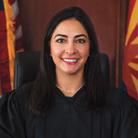
As a Middle Eastern immigrant woman, Adib credits her diverse background with making her more open-minded and compassionate. In her application to the bench, she said, “My parents sacrificed their lives to achieve the opportunity for me to have a better life. It would be my honor to continue the legacy of their sacrifice by making a difference in my community as commissioner. As a commissioner, I will listen emphatically to those that find themselves in our court systems. I will strive to make well-reasoned decisions and to better my community and those around me, knowing the opportunity my parents worked hard to give me.”
Adib says she hopes that she “will inspire others that look like me to recognize the power of their potential. I hope that little girls of color can see what is possible with hard work, dedication and a little luck.”
Portions of this article were taken with permission from Commissioner Adib’s application to the bench.
Scan and share this story with your network.
Alexandra Preece Barlow elected partner at Morrison Foerster LLP.
Kathryn Grey named principal at Fish & Richardson P.C.
Kassandra Castillo named partner at Wilson Sonsini Goodrich & Rosati LLP.
Max Halpern joined the Dixon Law Firm.
Patrick Hawthorne promoted to partner in Hanna Brophy’s Orange County office.
Rachel Hochstetler promoted to partner in Hanna Brophy’s San Diego office.
Ting Liu named partner at Robbins Geller Rudman & Dowd LLP.
Robert Rodriguez promoted to shareholder at Ogletree Deakins’ Sacramento office.
Evan Youngstrom named counsel in emerging companies and growth at Latham & Watkins’ San Diego office.
2016
Ross Bautista joined Carpenter & Zuckerman Beverly Hills’ office as a senior trial attorney.
Julianna Kat elected to San Diego Association of Corporate Counsel 2024 board of directors and received the Earl B. Gilliam Rising Star Award from the Earl B. Gilliam Bar Foundation.
Irean Swan promoted to shareholder at Klinedinst PC.
Cody J. Wisniewski named president and CEO at FPC Action Foundation.
Audrey Surridge honored by the San Diego County Bar Association with the 2024 Service by a New Lawyer Award and named among the 2024 Top Nonprofit Board Leaders of Influence by the San Diego Business Journal.
Trevor Locko ’15 (BA) joined Snell & Wilmer as an associate in the San Diego office.
Nicole Paschoal joined Sheppard Mullin LLP’s San Francisco office as an associate in the tax practice group and estate planning and wealth transfer team.
2019
Noel Meza elected secretary of the 2023-2024 San Diego La Raza Lawyers Association executive board.
Kimberly Keen joined Moore, Schulman & Moore, APC.
Molly Teas ’17 (BA) named Outstanding New Attorney by San Diego Defense Lawyers.
2021
Marcus Friedman joined the Consumer Protection Policy Center at USD Law’s Centers for Public Interest Law as administrative director.
Blair Kim joined Lewis Brisbois Bisgaard & Smith LLP’s Los Angeles Office as a member of the medical malpractice group.
Austin Prewitt joined Sheppard Mullin LLP’s Del Mar office as an associate in the business trial practice group and the tax practice group and estate planning and wealth transfer team.
Anayeli Zavala joined the city of Carlsbad as a deputy city attorney.
Maggie Baruffi joined Cooley LLP’s San Diego office as an associate attorney.
Ulrick Matsunaga promoted to associate attorney in the entity formation and tax practice group of Crosbie Gliner Schiffman Southard & Swanson LLP.
Bailey Mezan joined Higgs Fletcher & Mack’s transportation law practice group.
Julian Piroli joined Cooley LLP’s San Diego office as an associate attorney.
Class notes are as of June 30, 2024.
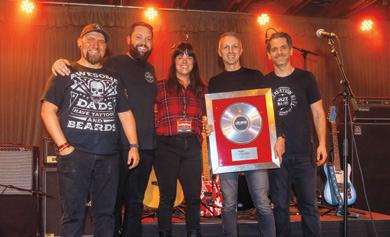
Josiah Reid ’11 (JD) channels his passion for music into good causes
Arizona resident Josiah Reid ’11 (JD) has a passion: “Rock Judicata.” Not the legal term, the rock band.
A shareholder and commercial real estate attorney at the Buchalter office in Phoenix, Reid is not your typical suit-and-tie attorney. After graduating with a degree in political science from the University of Minnesota in his home state, he took a gap year and came to San Diego. Falling in love with his adopted city, he applied to USD Law.
His most memorable experience at USD was at the Landlord-Tenant Legal Clinic, where he was mentored by Adjunct Law Professor Allen Gruber during the 2008 housing crisis. “It was my first exposure to boots-on-the-ground litigation, and it was for a good cause, helping people who were in a tough spot,” Reid recalled. “It inspired me to want to be a part of a real estate practice.”
He also had an externship with now-retired Justice James McIntyre on the California Court of Appeals. Of the experience, Reid said, “It helped me to understand the value of doing good legal work in indirect ways.”
When not negotiating transactions, Reid takes the stage playing drums in his band, Rock Judicata. In civil litigation, the res judicata principle indicates that if there is a final judgment based on merits, then another plaintiff cannot relitigate the same matter for the same cause of action.
Comprised of a Buchalter colleague and two other non-legal friends, Rock Judicata recently took home the Judge’s Choice award at the Law Rocks’ Battle of the Bands in Phoenix. Law Rocks is a nonprofit whose mission is to promote music education for underprivileged youth and raise funds for local nonprofit organizations by combining the power of music and the generosity of the global legal community. Rock Judicata raised over $10,000 for rock icon Alice Cooper’s Solid Rock Teen Centers in Arizona. Reid and his bandmates look forward to performing again, both for the enjoyment of it and the opportunity to give back to the community.
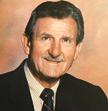
❱❱ James “Jim” Marinos ’58 (JD) passed away on March 7, 2024, at the age of 94. After serving in the United States Marine Corps, Marinos attended USD Law, just as the school was opening its doors. He held the distinction of being the first USD Law graduate to pass the California bar exam. Marinos served as the president of American Board of Trial Advocates (ABOTA) from 1987-1988, was a member of the San Diego County Bar Association for 50-plus years and tried more than 150 jury trials to verdict. He pursued a varied law career with a concentration on civil litigation involving complex personal injury and damage cases, business cases, partnerships and corporations litigation and employer-employee issues and causes of action. He conducted trials and hearings in all sectors of the legal hierarchy: in superior courts, federal courts, courts of appeal and in various administrative tribunals. Ever the generous alumnus, when Marinos retired and closed the doors to his office in downtown San Diego, he made available the entire contents of his law library to alumni, friends, students and others interested in the study of law.
❱❱ Betty Boone ’64 (JD) passed away on Oct. 31, 2023, at the age of 95. A pioneer for women in the legal profession, she started her career as a legal secretary. She married Elbert James “Jim” Boone, and the couple moved to San Diego in 1959. Soon after, she enrolled at USD Law, and became an editor of its first law review. She was the second
woman to graduate USD Law five years later. After she was admitted to the bar in 1965, she became the first woman associate trust counsel for Title Insurance and Trust.

In 1967 she became the first woman deputy county counsel in San Diego, where she rose to senior deputy, retiring in 1981. She then served as a city/county hearing officer for 14 years. Boone finally retired again in 1995 to focus on her interest in genealogy research. She was a founding member of Lawyers Club of San Diego, which promotes women in the legal field, serving as board member, newsletter editor, treasurer, and on the advisory board. She was the archivist for many years, and in 2022 the archives were named the Betty Evans Boone Archives. Boone was active in the First Unitarian Universalist Church of San Diego, where she served on the board and was president from 1968 until 1969 and from 1980 until 1981.
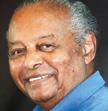
❱❱ Hon. James D. Floyd ’66 (JD) passed away in late 2023. In 1966, Floyd distinguished himself as the first Black graduate of USD School of Law. He made history again in 1976 as the city’s first Black administrative law judge. Judge Floyd also served as a deputy city attorney, a member of San Diego’s City Planning Commission and on the board of directors for the Legal Aid Society. Between 1973 and 1977, he taught at USD School of Law as
an adjunct professor of constitutional law and urban law. Floyd was profiled in the San Diego History Center’s publication Pioneers, Warriors, Advocates: San Diego’s Black Legal Community, 1890-2013.
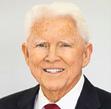
❱❱ Frank Ragen II ’67 (BA), ’72 (JD), passed away on March 12, 2024. Born and raised with a passion for justice, he was a wellregarded attorney specializing in federal criminal defense. While at USD Law, Ragen worked under the Hon. Howard B. Turrentine of the United States District Court. This experience not only honed his legal skills but also fostered a lifelong bond between mentor and mentee. Ragen was the inaugural recipient of the Hon. David H. Bartick Award for Civility and Professionalism in the Southern District of California in 2019. Throughout his 50 years of practice, he remained an active member of the National Association of Criminal Defense Lawyers, California Attorneys for Criminal Justice and the Federal Bar Association. The Ragen family has deep ties to USD and its founding organization, the Society of the Sacred Heart. Ragen recently provided distinguished service as a member of the law school’s Board of Visitors.
❱❱ Howard Wayne ’72 (JD) passed away on Nov. 2, 2023, on his 75th birthday. A longtime community leader, he served as a deputy attorney general, assemblymember for the 78th District and chair of the Linda Vista Planning Group. Among his many achievements was the 1997 passage of the landmark Assembly Bill 411, which required and standardized ocean
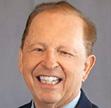
water-quality testing in California. Wayne was an adjunct professor at USD Law for several years, teaching advocacy skills and strategies. He served as president of the USD Law Alumni Association Board of Directors in 1977. Wayne was recognized at the San Diego County Bar Foundation’s 2024 Distinguished Lawyer Memorial reception. In May 2024, Wayne was honored with a street sign reading “Howard Wayne St” at the intersection of Morena Boulevard and Buenos Avenue in Linda Vista.
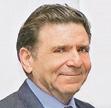
❱❱ Jerry Gonick ’84 (LLM) passed away on June 17, 2024, at the age of 87. Gonick and his wife of 47 years, Susan Gonick ’86 (JD), have been longtime supporters of the USD School of Law. Together, they played a critical role in the success of the Faces of Philanthropy Endowment Campaign. Gonick received his master of laws in taxation from USD in 1984. He held advanced degrees in law (LLM from USD, JD from the University of LaVerne), engineering, and business. Eventually retiring from the practice of law, Gonick served as a consultant primarily to the plaintiffs’ securities class action bar. He was a member of the original design and development team for the space shuttle at IBM.
❱❱ John D. Alessio ’91 (BS), ’94 (JD), passed away on Sept. 3, 2024, at the age of 55, after a brave battle with cancer. A respected managing partner of Procopio and a dedicated friend to the university, Alessio had a personal interest in everything he
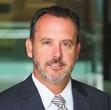
undertook and took pride in knowing numerous family members attended USD. A fourth-generation San Diegan and active in several professional associations, he served the local cross-border community as a director for the World Design Capital San Diego-Tijuana and as a founder of Red Autismo. For seven years, the San Diego Business Journal recognized him on its San Diego 500 list of Most Influential Business Leaders in San Diego, and in 2020, he was named to its San Diego 50 list of Leaders Making a Difference.
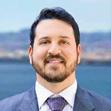
❱❱ Cameron Weiss ’12 (JD) passed away on Sept. 10, 2023. Born in San Diego in 1985, Weiss was a devoted baseball and football fan. He spent his childhood at Qualcomm Stadium, and later Petco Park, watching his favorite players, Tony Gwynn and Junior Seau. After receiving his law degree from USD, Weiss parlayed his passion for sports into a groundbreaking career. With his business partner, Joe Barkett, Weiss launched a sports agency called Empire Athletes in 2012, and seven years later founded Dynamic Sports Group. As the group’s president, Weiss represented baseball and football clients, negotiating over a quarter billion dollars in client contracts throughout his career.
1958
James “Jim” Marinos
1963
Nicholas Banche
1964
Eugene Bambic
Betty Boone
James O’Neal
1966
Hon. James D. Floyd
1967
Henry Mann
Charles O’Rourke
1969
Alan Crittenden
John Hagan
William Holman
1970
Joseph Favor
1971
Lee Adams
Dean Bekken
1972
B. James Brierton, Jr.
Frank Ragen II
Howard Wayne
1973
Terence Haddock
Merle Norman Schneidewind
1974
Mary Eikel
David Miller
Dwight Preston
Peter Quint
1975
Robert Launders II
1976
Donald Lee Christensen
1977
Wayne Raffesberger
1978
Lt. Col. Johnnie L. Newton
1980
Charles Pretto
1981
Roger Heaton
1982
Judy Honcik Lovett
Robert Rochelle
Fred Uebbing
1983
Frank McLaughlin, Jr.
Ronald Russell
1984
Jerry Gonick (LLM)
1987
Karen Jantzen
1991
William Cole
Loretta McDonald
1994
John D. Alessio
Lorinda Harris
1995
Heidi Richter
1998
Matthew Butler
Dr. Eugene Hirschkoff
1999
Jack Balderson, Jr.
2006
Samuel Eastman
2012
Cameron Weiss
USD Board of Trustees
Peter Seidler
Members of the USD School of Law community connected with one another at reunions, receptions and signature events.
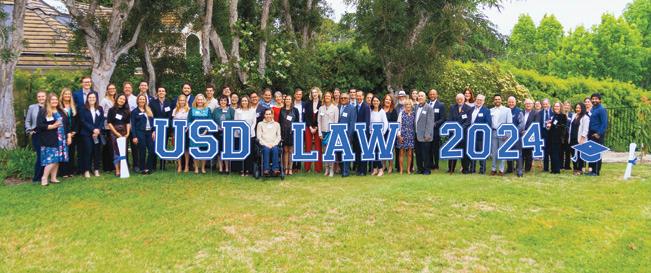
❱❱ Lisa and Matthew Abbot ’15 (JD) hosted a reception to honor USD Law’s Board of Visitors, the Law Alumni Board, Maudsley Fellows Society members and the Class of 2024.
North County Alumni Social at Pacific Coast Spirits in Oceanside
❱❱ Thank you to event sponsors USD Alumni Association Board member Charles Meyer ’ 03 (BA), ’07 (JD), and Chris Hendricks ’08 (JD).
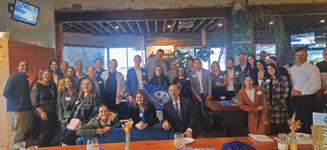
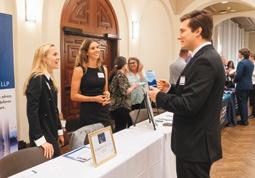
❱❱ Mary Allain ’18 (JD) and Brooke Arthur ’22 (JD) connected with current law students and alumni at this annual 400+ person event hosted each October.
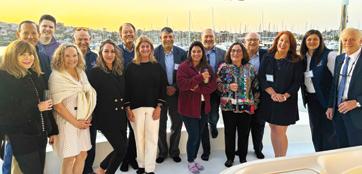
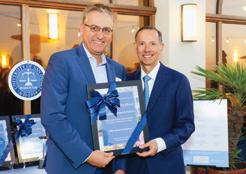
❱❱ Board of Visitors member Ed Schlesier ’89 (BA), ’00 (JD), accepted 100% Participation award from Dean Robert Schapiro on behalf of Blanchard Krasner & French.
Bar Swearing-In Reception at James M. Carter and Judith N. Keep U.S. Courthouse
❱❱ July bar passers celebrated their admission to the State Bar of California. The Carter-Keep Courthouse is named for former federal judges James M. Carter and Judith N. Keep ’70 (JD).
An Evening Aboard the Sapphire Star
❱❱ Alumni and friends gathered aboard the private yacht of USD Trustee Emeritus Michael Kaplan ’72 (JD) and his wife, Terri, for a discussion about the future of law school spaces.
Dean’s Holiday Party at La Gran Terraza Restaurant
❱❱ Alumni, donors, faculty and administrators rang in the holidays.
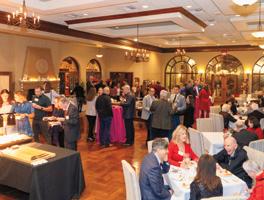
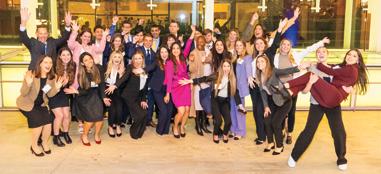
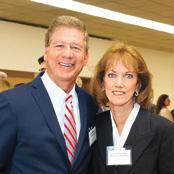
Judicial Reception at USD School of Law
❱❱ Past San Diego Superior Court
Presiding Judge and Board of Visitors member Hon. Robert Trentacosta ’79 (JD) and current Presiding Judge Hon. Maureen Hallahan ’81 (JD) joined more than 100 students, alumni and members of the judiciary at this annual event hosted each spring.
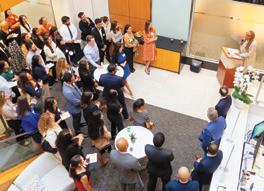
❱❱ Dr. Regina Dixon-Reeves, USD vice provost for diversity, equity and inclusion and director of the Center for Inclusion and Diversity, addressed 1L students.
The Classes of 2020, 2015, 2005, 2000, 1995, 1985, and 1975 return to campus in Fall 2025 for their Milestone Reunion celebrations. law.sandiego.edu/reunions
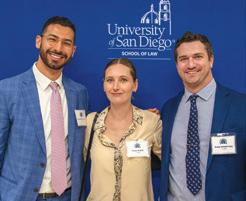
❱❱ Saleem Hawatmeh ’19 (JD), Hana (Farquhar) Dorne ’18 (JD) and Evan Armstrong ’19 (JD) showed support for the law school’s Big Give.
❱❱ The Classes of 2019, 2004, 1999, 1994, and 1984 celebrated Milestone Reunions at USD in September. The Class of 1974 celebrated their 50-Year Reunion at the Golden Toreros Dinner with USD President James T. Harris III, DEd, and USD Law Dean Robert Schapiro in October. law.sandiego.edu/reunions
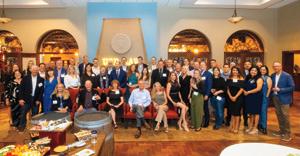
❱❱ Thursday, Nov. 21, 2024: Celebrate alumni achievement and support the Justice Through Legal Education Fund. The esteemed alumni recognized with the Distinguished and Rising Star Awards are a testament to USD’s effective approach to legal education. law.sandiego.edu/daa
3 6 - H o u r C a m p a i g n
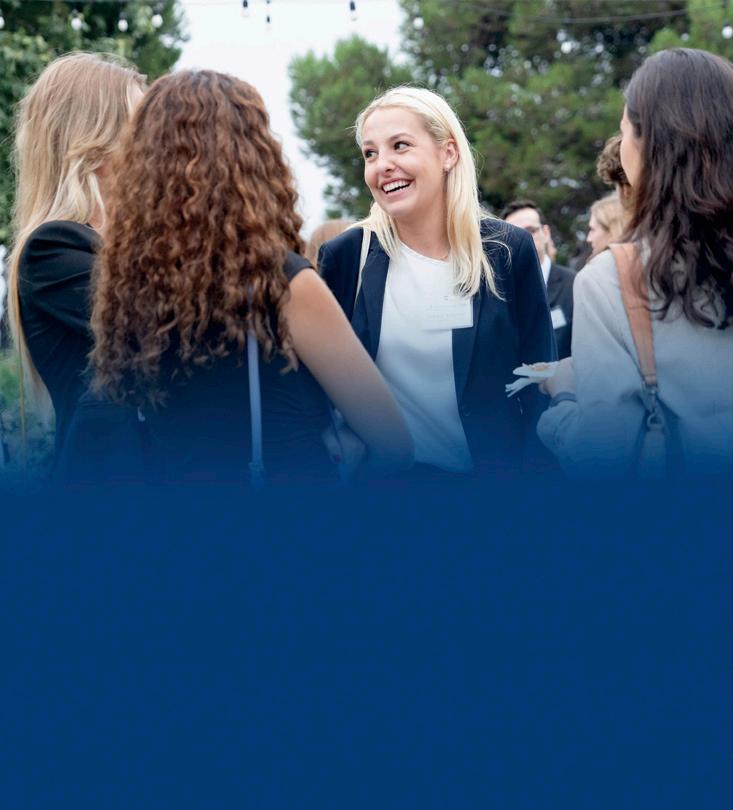

5998 Alcalá Park
San Diego, CA 92110-2492
Change Service Requested
FIRMS WITH 10+ ALUMNI
100% ALUMNI PARTICIPATION
Blanchard, Krasner & French*
Finch, Thornton & Baird, LLP*
Morrison & Foerster LLP
GREATEST NUMBER OF ALUMNI PARTICIPATING
Blanchard, Krasner & French*
Finch, Thornton & Baird, LLP*
Higgs Fletcher & Mack LLP*
SIGNIFICANT DOLLARS RAISED
Finch, Thornton & Baird, LLP*
Higgs Fletcher & Mack LLP* Procopio* Qualcomm*
DLA Piper* Morrison & Foerster LLP
Wilson Sonsini Goodrich & Rosati* Buchalter APC
FIRMS WITH 6-9 ALUMNI
100% ALUMNI PARTICIPATION
Wingert, Grebing, Brubaker & Juskie, LLP
GREATEST NUMBER OF ALUMNI PARTICIPATING
Wingert, Grebing, Brubaker & Juskie, LLP
Witham Mahoney & Abbott, LLP
SIGNIFICANT DOLLARS RAISED Clark Hill PLC
Delphi Law Group, LLP*
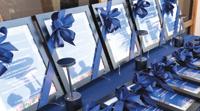
FIRMS WITH 2-5 ALUMNI
100% ALUMNI PARTICIPATION
CaseyGerry*
Dallo Law Group APC
Fell Law*
Kalfayan Merjanian LLP RJS Law*
GREATEST NUMBER OF ALUMNI PARTICIPATING Dallo Law Group APC RJS Law*
SIGNIFICANT DOLLARS RAISED
CaseyGerry*
Fell Law* RJS Law*
To see the list of all participating firms and to join the Law Firm Challenge, visit law.sandiego.edu/lawfirmchallenge.
*Special thanks to firms that have funded private student scholarships.
